#and i will never ever forget that moffat was the first person to tell me that no
Explore tagged Tumblr posts
Text
14 years since fish custard
Fourteen years since I truly saw myself on screen for the first time. A broken little girl who grew up too fast, whose entire self worth was based on her body.
Fourteen years since the loneliest little girl who put all her faith in a madman with a box saw on screen the loneliest little girl who put all her faith in a madman with a box.
Fourteen years since my only friends were characters in a daft little science fiction show whose only friend was a daft little science fiction man.
Fourteen years since I saw a character with all my coping mechanisms, all my abandonment trauma and self-harmful borderline-suicidal tendencies.
Fourteen years since I was first told I could still be loved despite them. That I wasn't stupid or childish or delusional for putting my love and faith and care into someone who nobody believes is real.
Fourteen years since fish custard and, ironically, fourteen years since the month I turned fourteen.
#vent#about#mine#dw#doctor who#i'm having a lot of feelings#i was a child#i didn't deserve that#and i will never ever forget that moffat was the first person to tell me that no#no i didn't deserve that#i deserved to be believed and taken seriously and loved#and most of all the Doctor would love me too
9 notes
·
View notes
Text
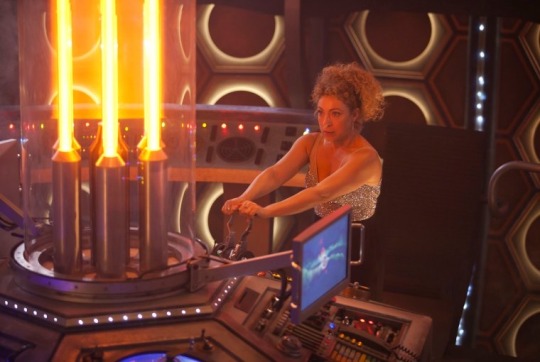
Doctor Who's Alex Kingston on hiding River Song's biggest spoiler
"I'm very good at keeping secrets."
"She's not a companion, she's a wife!" Alex Kingston is quick to correct about her beloved Doctor Who character River Song.
And she's completely right. River Song is unlike any other Doctor Who character, first introduced in 2008's Silence in the Library and spanning multiple eras in one of the most complex and glorious timelines to ever grace the show.
"She's the most incredible character to play, and certainly when the role was offered to me, I had obviously no idea of the journey that both she and I would be undertaking - because obviously in the very first Silence in the Library story, she dies," Kingston exclusively tells RadioTimes.com.
"So, I just thought it was a two-episode job. Little did I know! I also didn't really know the personalities of Russell [T Davies] or Steven Moffat, and if I had, maybe I would have had an inkling that there must be more than this."
River's had countless adventures since she was first introduced more than a decade ago - she's appeared on-screen with three different incarnations of the Doctor and, in her work with Big Finish, Kingston has collaborated with every single living actor to have played the Time Lord.
But there's one particular scene that many fans will never forget. In the emotional season 6 episode A Good Man Goes to War, River reveals to Karen Gillan's Amy and Arthur Darvill's Rory that she's their daughter, Melody, providing a plot twist for the ages.
In an incredibly apt turn of events, showrunner Moffat told Kingston about the reveal a good six weeks before everyone else, with the actress having to keep the explosive secret to herself because... well, spoilers.
"On this particular occasion, I was asked whether I'd be available, and Steven also contacted me and basically gave me the rundown of the storyline ahead of anybody else knowing," she recalls.
"He didn't want [the other actors] to know, because I think he didn't want their performances in any way to be altered with that knowledge - and also, in a funny sort of way, in the episodes that we had filmed prior, I didn't know either.
"The performances that you get from all of the actors are incredibly true, because there is no knowledge about who you really are or what you're going to reveal.
"I quite liked that, because you literally play - and, in fact, one always has to do this with Steven because he has so many threads that he's just tossed out to drift on the wind, until he decides to pull that thread back in and tie it up with something else. So you just have to literally play the moment all the time and not think about anything else.
"So, when Steven did give me this insight, I had a very big secret that I had to keep. The other actors, Karen, Arthur and Matt, they knew that I had a secret and I just wasn't going to tell them.
"There were bribes and all sorts of things... but I wasn't going to give the secret away. Even on the filming day, the script didn't have the reveal in it.
"Steven didn't put it in the script because he didn't want any of the crew to know and he didn't want that storyline and that secret to somehow get out before the audience actually saw it for the first time on television.
87 notes
·
View notes
Text
Headcannons
These are just some headcannons I have concerning the Doctor, the TARDIS or Doctor Who in general. They should be considered cannon for my version of the Doctor. All of them are based on evidence from the show or comics as well, and if you wish to see that, let me know and I can provide you with episode titles. If anyone ever wants to RP with me and you don’t have ideas for plots, these could lead to those. A lot of these may seem familar to people I’ve RPed with. I’ve always kind of had them in mind, and I’ve used all of them in at least one or two RPs, but this is the first time I’m actually writing them down.
Before the headcannons, I do consider almost everything from Moffat and RTD’s written books to be mostly cannon. You can read more about that here.
For a more in depth explanation of any of them, go here. Just click here.
Headcannon 1: The TARDIS has every type of room you could possibly imagine. It’s infinite and the Doctor can add rooms at the control panel. He always adds a bedroom for every companion he takes on board. The TARDIS senses the thoughts of the people he brings on board and sets up their bedrooms perfectly for them, although the Doctor does have a little bit of control over this, which is why a majority of the bedrooms in the TARDIS have bunk beds.
Headcannon 2: The Doctor has met Santa Clause. He calls him Jeff. Santa Clause used to maintain a workshop on Earth in the North Pole, but due to the air planes in the area, he moved them to a planet the Doctor typically refers to as the North Pole planet although it doesn’t actually have a name. In order to get all the presents delivered in a single night on Christmas, Santa uses time loops and clones of himself which the Doctor helped him set up.
Headcannon 3: The Doctor only tells people he absolutely loves his real name. This is because in the Galifreyan language, there is no word that means the same as being in love romantically. Instead, Time Lords pass on the key to their tombs (their real name), as their symbol of the feeling. Since a Time Lord’s tomb will contain their time line for anyone to modify, this is the ultimate form of appreciation and love for a Time Lord. It shows that the Time Lord truly trusts the other person and that’s why only the people who the Doctor truly loves ever finds out his name. That being said, the Doctor can use the word love referring to a family type of love or how he might love a certain flavor of ice cream or a new piece of furniture or just about any other way other than romantic love.
Headcannon 4: Time Lords don’t reproduce the same way humans do. While they still have all the body parts nessesary for it, they have evolved to a point where they are no longer needed. Instead, when two Time Lords (a male and a female) which to reproduce, they form a psychic and share all their memories with each other. The baby is formed out of those memories and will appear out of regeneration energy next to the mother.
Headcannon 5: The Doctor’s pockets are bigger on the inside and he likes to carry momentos of his previous adventures in them.
Headcannon 6: The TARDIS wardrobe is the size of a football field full of clothes. In the center, the Doctor keeps all his former regeneration’s outfits on a rack on display. He does this so he remembers all the previous faces he has had, and he keeps all the clothes so that he has plenty of clothes to choose from in case of a regeneration since he never knows what size or gender he might be. This is particularly weird if you consider the fact that he never changes clothes and will even go swimming in his usual outfit.
Headcannon 7: The Doctor doesn’t have a bedroom. Time Lords rarely sleep and he sleeps in the console room when he does.
Headcannon 8: The Doctor owns several fezes and collects strange hats previously owned by famous people or historical figures, however he’s always constantly losing them and keeps forgetting to set up a room for them.
Headcannon 9: The first face of the Doctor set up a code word for himself besides his name that only he knows. The word is the old galifreyan word for Doctor, and since nobody else in the universe speaks old galifreyan, nobody else can pronounce it (It was even a lost language on Galifrey before it disappeared, before the Doctor even left the planet for that matter), only he knows the word. He uses it as a code word when he runs into his other faces so that they know that it’s him.
Headcannon 10: The Doctor will travel with several different companions at once and sometimes they’ll never run into each other due to their sleep schedules and his lack of sleeping.
Headcannon 11: The Doctor falls for women quite easily, and will sometimes have multiple significant others. This is due to time travel. To him, everyone is always being born and dying, so there’s no way for him to know about a break up or death, especially when he sometimes meets people in the wrong order.
Headcannon 12: The Doctor is kinky. He’s generally a sub. River Song is the one who introduced him to this. This is why she carries handcuffs everywhere, because she enjoys using them on him. (If any Rivers want to RP their first interaction with this, that’s an idea)
Headcannon 13: The Doctor has a machine that can track a person’s memories and take the TARDIS back into the time and place of that memory.
Headcannon 14: The Doctor hates choosing the location for places to go when he’s with other people, because he can choose the location any time he wants
Headcannon 15: Whenever the Doctor is handed alchohol, he always tries it even though he doesn’t like it and always spits it back out into whatever he’s drinking it from
Headcannon 16: The Doctor is constantly messing with new “apps” for the sonic, although he still hasn’t figured out how to make it do wood. Although he says he just hasn’t had the time to do it yet, the truth is he doesn’t know how. He has figured out how to turn it into an MP3 player however.
Headcannon 17: The Doctor doesn’t like being told what to do unless he asked to be told.
Headcannon 18: The Doctor never forgets a face and always remembers every previous companion
Headcannon 19: The Doctor will occasionally do house calls to people who are hurt, suffering or scared. He regularly goes out and finds people who are crying and tries to cheer them up.
Headcannon 20: While the Doctor does keep many secrets, if you were to sum up every single thing he’s ever told anyone about himself, you’d generally know almost everything there is to know about him.
Headcannon 21: The Doctor’s favorite food is Fish Fingers and Custard, but his second favorite food is spaghetti, followed by anything chocolate.
Headcannon 22: The Doctor has a fluid sexuality. It changes with each regeneration. Eleven is generally straight. Most of his previous regenerations have been asexual or pansexual.
Headcannon 23: The Doctor has a doctorate in everything.
Headcannon 24: The Doctor loves video games! His favorite are on the Wii, but he enjoys other games too
Headcannon 25: While the Doctor has been a vivid reader in the past, due to the ADD like nature of his current face, he doesn’t read often in his current face. This is especially sad if you remember how fast he reads through books.
Headcannon 26: The Doctor really doesn’t like endings. This doesn’t just apply to books. He never finishes video games, TV series or movies unless someone else is involved.
Headcannon 27: Except for possibly Susan which the Doctor never went and checked up on, and possibly his mother, the rest of the Doctor’s family is known to be dead for a fact. Even though Galifrey was rescued in the end (during the 50th anniversary special) most of the Doctor’s family was already dead.
Headcannon 28: The Doctor is allergic to most human drugs. This includes natural ones.
Headcannon 29: The Doctor doesn’t care for having domestics on the TARDIS. While he had learned to be okay with couples, he still prefers to not have kids and pets traveling with him.
Headcannon 30: Of all Eleven’s previous faces, his favorite are his 10th, 8th, 5th, 4th and 2nd. He doesn’t care much for his first, but always listens to him for advice. He gets along okay with his third, ninth and seventh. He doesn’t get along well with his sixth. While he does get along okay with his war doctor face, even after saving Galifrey he’s still too afraid of the other actions he did in that face to care much about it.
Headcannon 31: It’s common knowledge that the Doctor (particularly the 11th and 12th) don’t usually notice changes in physical appearance. However, this actually isn’t just the Doctor, but a Time Lord thing in general. Because of regeneration, Time Lords are constantly changing bodies anyway and so they recognize people based on personality alone, not physical appearance and have no idea of the difference between an average looking person and an attractive one. In Classic Who it’s referenced several times that they can tell who each other are, even if they haven’t seen a new regeneration before, so it makes sense that appearance would matter very little to them.
Headcannon 32: The Doctor’s birthday is November 23rd, however he has actually lost track of how old he is.
Headcannon 33: The Doctor and the Master left Gallifrey around the same time for almost exactly the same reasons. There’s a LOT of different reasons, (including but not limited to them looking for each other and political reasons related to Gallifrey’s political scene, and reasons mentioned in the show like running away from looking into the time vortex and running from the Hybrid and a ton of other reasons too) but ultimately their reasoning was almost the exact same, around the same time, completely by coincidence.
6 notes
·
View notes
Note
I hate doctor 11 but ive never been able to explain why in like words lmao. He feels like such a mary sue character imo and like theres something about his characterisation that was always just really ineffective (like the stuff about fishfingers and custard or whatever it was). Imo i'd love to hear you give top 5 worst things about the 11 era because i rlly just love when it gets torn apart
i hold nothing but a seething contempt and loathing for that man. every time he appeared on screen i felt ready to snap like a riled up chimpanzee in my enclosure. i am frothing at the mouth and overcome with a desire to start flinging heavy objects. this might be incoherent and inconsistent but i started this rewatch in feb 2020 and only finished this week so i got through 11′s episodes last august/september time and i refuse to revisit it to jog my memory or fact check anything i’m saying here because this man does not deserve the space in my mind for that.
the first thing is i can’t fucking STAND the quirky whimsy timey wimey bit he has going on all of the time. i can’t even say this is because this is a kids show and i was a teen and then adult when i first properly watched him but actually!! when i was eleven years old i’d sleep over at a friend’s house most weekends and it always coincided with the airing of a new season 5 episode and i remember we watched the finale with the dumb time hopping to get out of the box prison that was never explained and didn’t make sense and i thought at the time “this is really stupid”. and before that my only other doctor who exposure was watching the david tennant christmas specials with another friend and throughout childhood my only opinion on doctor who was “this is a tv show that is not for me but is one that all the boys i am friends with like so i will put up with it to maintain our friendships” but at least those episodes were both suspenseful and engaging enough to keep me watching all the way through. like who the fuck does an end of the world sci fi plot and approaches it with an “oopsy woopsy i am a funny little alien man who is going to stop you all by making you do a hecking silly” like it’s unneeded and self-parodies an already cheesy show to the point where it becomes unwatchable and makes it impossible to ever take this man seriously.
next thing that downright sucks ass so badly is the stupid fucking overwritten constantly escalating plotlines. like everything from season 5 up until his regeneration at the end of season 7 is meant to be this grand interconnected cosmic plot about how...the doctor trying to bring back his planet will end the universe or something so all the top powers across all of reality tried again and again to stop him from doing that except he doesn’t know what’s going on so he keeps thwarting these people who supposedly mean good?? i mean i sure don’t fucking know what they were trying to say!! like for some reason we never get the doctor suddenly becomes this superdemon that threatens everything so these people (whoever they are) decide to, in sequence: suck him through a time rift to erase him from existence, trap him in a prison and remake a universe without him, take his companion’s baby and turn her into a perfectly trained doctor killer, form two(!!) secret societies to hunt him throughout history that are only stopped by his companion splintering herself across his personal timeline to protect him, and repeatedly cause reality collapsing events because it’s a kinder outcome for the universe than what he will do. this grand and terrible event turns out to be...he spends a few hundred years chilling by a rift that leads to his home planet and protects a few generations of children from monsters which convinces them to give him infinite regeneration power then fuck off back to their pocket universe. and it’s like!! what is the point of anything that happens in this man’s era when everything is always “the darkest moment” or whatever the fuck!! i don’t care!! we never get a compelling reason to believe this bumbling clown of a man could ever be a universal threat!! the whole thing is so dumb i hate it!!!
thing number three i hate is how the eleventh doctor is ALSO characterised as this abrasive egotistic male supergenius to the point where he becomes genuinely indistinguishable from bbc sherlock. genuinely who enjoyed seeing this guy constantly tell people their tiny human minds can’t comprehend what he’s doing and then basically just wave his magic wand to solve whatever problem each episode is facing. 2012 is the year of human sin because this fucking shitsmear character archetype somehow became both a redditor role model AND a tumblr sexyman and it’s like!! nobody is enjoying this stop making this seem cool! him saying timey wimey thing any time he does anything is frustrating and dumb and locks the viewer out of giving a fuck about anything that is happening! smartest man in the room syndrome is a disease and the eleventh doctor is terminal with it. like remember how they established river as an accomplished scientist (when she wasn’t being a child soldier or a time paradox or whatever the fuck) and every time that came up mr doctor eleven man was like “oh this thing is obvious because i’m a genius and you didn’t realise because your brain is tiny so get out of the way and let the grownups think” or that time it turned out amy had been replaced with a slime clone for half the season and the doctor chewed rory (audience surrogate) out for somehow not realising this fact we didn’t know right from the start and like. this served no purpose other than to draw into severe question why the doctor is also this super beloved magical figure implicitly trusted by all children everywhere like. mr steven moffat is totally allergic to writing and solving mysteries in his tv show and fuck you for wanting to figure things out as you go along based on the new evidence you uncover at strategic plot intervals just let this asshole man use magical thinking to reveal he knew the answer all along and you’re a fucking idiot for not also realising this thing which had no basis or precedent anywhere else in the show.
speaking of dumb things let us not forget the absolute shitshow that was minority representation in this era. i’m not even talking about the low hanging fruit of how genuinely unironically sexist amy and clara were written where each episode moffat either seemed to loathe them or was incredibly horny over them and they had no character growth or arc or fucking anything. i’m talking about how fucking shit terrible the incidental representation was. god remember how every single fucking gay person who appeared in this era was written as one incredibly fucking stupid joke and how the women were all either sexy dominatrix, feeble girl in love, or Mother (or all three in some really terrible cases) and i’m not qualified to talk about this but also how incredibly white this era was and how on two separate occasions we had monarchs reimagined as sexy girlbosses with a gun played by black women who the doctor leched over. nothing about any of this was good ESPECIALLY coming off the back of rtd who was surprisingly forward thinking for 2005 and did a really good job of positing travel with the doctor as queer allegory. in comparison moffat gave us THE MOST heterosexual shlock i’ve ever had to endure. amy and rory could have been interesting characters were they not hemmed into this domestic bickering young straight married couple bullshit that was in no way changed or altered by traveling with the doctor except for the quasi incestuous river song reveal that was dumb and bad and stupid.
the last major mega gripe i have with the series is moffat’s fucking jingoistic boner for british military aesthetics. this carried over throughout his entire tenure as showrunner but was super terrible vomit inducing in eleven’s era. the unironic admiration for ww2 britain and winston churchill is downright wretched. are you incapable of telling a second world war story outside of churchill’s london and plucky blitz fighters. shit gives me hives so badly. and then!!! that weird church owned army that features in the future that end up being bad not for the concept of what basically amounts to an imperialistic intergalactic rendition of the fucking crusades but because they’re part of the nonsense go nowhere puzzlebox narrative that says the doctor is a not good man who will do bad things to the universe :(. remember how rtd’s doctor was a freshly traumatised man hot off the war criminal press who time and time again vehemently refuses to engage in military violence, but who tragically inadvertently turns every one of his companions into soldiers in his own personal army, and he has this moment of complete horror at the realisation and it is this which causes the downward spiral that ends in 10′s regeneration. and then how there’s this cringe line about how there’s a force of people who are “the doctor’s army, always ready to fight his battles when he’s not around” or some shit and then it turns out this is actually massive literal military operation and we’re meant to celebrate this. fuck off.
bonus round because this needs to be said but i have never hated anything like i hated that fucking human tardis episode. everything about it induced violent anger in me from the sickening overindulgence of that softgoth dark whimsy helena bonham carter tim burton aesthetic to the bafflingly terrible evil carny stereotype of those junk scavengers to the overblown sudden tragic shipbait romance of human tardis and the doctor. every word out of her mouth was trite shit and the fact that the death of her body was presented as this super emotional dramatic scene despite there being no buy in or incentive to care and the fact that every single person on tumblr in 2012 ate that shit up like it was fucking gourmet. i loathe every single thing about that episode so much.
#Anonymous#hi bestie here's 1500 words of me getting mad about the worst television experience i had in my life#why the FUCK was this man tumblr's favourite back in the day. what the fuck did anyone see in any of this shit#i never want to think about dr whom ever again
8 notes
·
View notes
Note
i felt the same way about 11, i didn't really hate him but i never really felt emotions about him or his companions. also tbh i thought he and Amy were kind of annoying at times? there there was good episodes and stuff but the writing for them and like. overall was just. not very good! im trying to rewatch his seasons though bc i stopped watching around when Clara showed up and I want to catch up for the new season
The Amy/Eleven thing kills me because for the first few episodes I was into their dynamic until we get to know Rory better. Then in the episode Amy’s Choice, Amy waits too long to choose and we see what losing Rory does to her, she scorns Eleven and tells them she chooses Rory. Great, okay. We see her watch Rory die a second time in Cold Blood and then she promptly forgets he ever existed because, idk, time magic. Then later the love of her remembering what their engagement ring means brings him back. Right?? This is all supposed to establish that Amy chooses Rory over the Doctor, yeah?
So then literally why. when Eleven shows up at HER AND RORY’S WEDDING, WHY DOES AMY WANT TO KISS ELEVEN?? Why does Amy hug Eleven in greeting and cling to them like Rory doesn’t even exist in “The Impossible Astronaut”? And then in “Day of the Moon” we have to watch Rory react as his wife cries out for the Doctor to save her literally seconds after Rory says “I’m going to save her.” Rory guarded this woman with his life for 2,000 years and the second she’s in the same room as the Doctor it’s like he doesn’t exist. It’s fucking Rose choosing Nine over Mickey all over again but WORSE because Amy SAYS she chooses Rory but her actions show that she’s still deeply in love with Eleven and this is to Rory’s emotional detriment.
Idk I loved Rose/NineTen as y’all know but I really want more female companions who aren’t fucking in love with the Doctor and/or have personalities and desires outside of loving the Doctor
In summary, me @ Steven Moffat, always:

15 notes
·
View notes
Text
Timeline
“First” Regeneration Cycle
Body - Title - Portrayed by.... 01 - The First Doctor - William Hartnell (Richard Hurndall*, David Bradley**) 02 - The Second Doctor - Patrick Troughton 03 - The Third Doctor - Jon Pertwee 04 - The Fourth Doctor - Tom Baker 05 - The Fifth Doctor - Peter Davidson 06 - The Sixth Doctor - Colin Baker 07 - The Seventh Doctor - Sylvestor McCoy 08 - The Eighth Doctor - Paul McGann 09 - The “War” Doctor - John Hurt 10 - The Ninth Doctor - Christopher Eccleston 11 - The Tenth Doctor - David Tennant 12 - The "Metacrisis” Doctor - David Tennant 13 - The Eleventh Doctor - Matt Smith
“Second” Regeneration Cycle
14 - The Twelfth Doctor - Peter Capaldi 15 - The Thirteenth Doctor - Jodie Whittaker
Unknown Placement
?? - The “Ruth” Doctor - Jo Martin ?? - The Curator - Tom Baker
Personal Alternate Doctors / Castings / Notes
16 - The Fourteenth Doctor - Gillian Anderson Notes: Short hair, outfit appearing as in Winser London photoshoot. Similar in character to Capaldi’s final season as the Doctor. Generally keeps calms and collected, but with a twinkle in her eyes she takes a quiet enjoyment to travelling the universe. After regenerating from the her previous 13th incarnation, the 14th Doctor takes a more restrained approach to adventure. She now tends to actively seek more quiet and passive locations, after seeing the accumulating effects of her presence across the space and time. She now vows more so to observe the universe rather than get directly involved with action and adventure. This is not to say that she shys away from people in need, indeed her sense of duty is punctuated by a distinct motherly-feel. This is similar to the 12th Doctor’s ‘magician granddad’ take, but she would appear to be less emotionally distant and more have more humanistic qualities. If the more optimistic portrayal’s of the 10th, 11th and 12th Doctors could be surmised as “Romantic Adventurer”, “Cosmic Fairytale”, “Magician Granddad”, then Anderson’s Doctor could be described as a “Dutiful Observer”. The darker sides of these Doctors can be boiled down to “the man who regrets, the man who forgets, and the man who forgives”. Anderson’s darker side could be aligned as “the tainted nostalgic”: She travels the universe, now not only seeking things to appearance things for the first time, but mostly to re-experience them to gain true validation and meaning from these experiences (akin to Donald Gleeson’s character by the end of About Time). Following her realization of the Timeless Child arc, she realizes that she remembers very little of even her most recent incarnations. For most of the season arc, the 14th Doctor consults old diaries (such as River Songs) for inspiration or just to relive the moments. (Indeed, I would love to have an episode in which 14 reads exerts of the diary, or relives adventures with old companions, in a fun, nostalgic wholesome scene inside the TARDIS). Whilst on the surface 14 expresses a comforting, positive outlook on her past lives, but like 10′s explanation of Gallifrey to Martha in S3, this is a choice to remember the good bits. The main arc this Doctor will go through will be seeking both a mix of old and new experiences, but slowly becoming more and more aware that, while her influence on the universe may be good as a whole, or short term, it is often those closest to her who repeatedly suffer. (I know this is an arc that was somewhat touched upon during both RTD’s and Moffat’s eras but I want to take this approach more subtly). The 14th Doctor represents a far more mature realization of a female doctor, and her character arc specifically would delve more into the Doctor’s true self, and the inner turmoil she hides from herself as all of her previous and future personalities constantly bubble away inside. ?? - The “Future” Doctor - Tilda Swinton Notes: Future, edgier, Doctor. Swinton’s Doctor would be cold, sophisicated, and no-nonsense. Tilda Swinton’s Doctor is cold and weathered, more so than even Capaldi’s first season. She is callus and ruthless in saving people. By this point, she admits she does not even have a concept of how old she might be, but at least over 5,000 years. She has shortish hair, a fringe off to one side, a lanky suit and tie - similar to her appearance in Constantine (2005). Swinton’s TARDIS design is similar to Capaldi’s in aesthetic, but dark and dingy. Practical looking, with bookshelves and shelves, without any silly gadgets. She has a very dry, morbid sense of humour, if any at all. At some point in her adventures, the 14th Doctor comes across this future incarnation of herself. Episode outline: We join 14 and compaion mid-adventure, they are aboard some sort of spacecraft. 14 has already done most of the work “saving” prior to the episode opening, but now faces a moral dilemma - save the crew aboard, or kill a new infantile species. Both species require the opposite atmospheric conditions to survive, so the Doctor can only choose one. At the last moment, the Swinton Doctor steps in and immediately jettisons the alien species. 14 is shocked and demands to know who she is, to which Swinton ignores her first, walking swiftly away. “Stop there, I demand you tell me who you are” shouts 14, following the mystery woman down a thin corridor. “Doesn’t matter, you can go about your business now”. “Who gave you the right to commit genocide, that was an innocent species who barely just crawled out of the womb.” Swinton turns “I’m the Doctor. I own those rights.” TITLE SEQUENCE Throughout the early parts of the episode it becomes clear that the future Doctor has no idea who 14 is, but does not dismiss her immediately, but eventually admits that 14 “probably is telling the truth” but she can’t actually remember her, to which 14 replies that is impossible, as she “never forgets a face”, to which Swinton replies calmly that she is so old now, she simply cannot remember everything she has ever done or experienced, or even simply she cannot remember everyone she once was. Eventually 14 and Swinton have a DMC. She no longer travels with companions, indeed cannot even remember who the last one was. Her lust for adventure and optimistic outlook has long been shattered, now instead she is tainted by millennia of saving people. It is routine for her, and she cares not for the people she saves, describing herself as a caretaker who can never quit. (To 14) “I remember being like you. (...) Well, not you specifically... but like you. Young. Optimistic, always looking for the good in the universe. Thinking that travelling through time and space was such a gift, and how lucky I was to have that all to myself. It took me a long time to realise I was wrong. I wasn’t lucky, or special. Not a traveler, or a tourist, or an observer. ... Nope. This is my burden to bear. Do you know how big the universe is. And then the size of that applied through all of space in all dimensions. When yourself make a habit of saving people, it’s no longer just kindness. It becomes expected. It’s like with any hobby; it starts off as such a small portion of your time. You do it every now and again, perhaps when you fancy it or when you need to. But that over time that enjoyment becomes duty. That becomes obsession. Then addiction, until eventually you’ve spiraled out of control and now, this is your life. But with no end to it. Just saving people, forever, like a caretaker who can never quit.”14 is shocked by this pessimistic future version of herself, and whilst her companions try to understand, 14 is very deeply effected by this, realising that despite the fact she is already incredibly old even by Timelord standards, compared to this future incarnation she is nothing. This is a Doctor who has even come out of retirement, now facing the consequences of a life that can never end, realising that even if she were to do nothing for the entire lifespan of the universe, she could just hop into the TARDIS, and do it all over again. Infinitely. The only reason she now saves people is because there is now nothing for her to do. She has lived every experience she can experience, touched every star to have ever been born, and watch them all die too.
3 notes
·
View notes
Text
Laugh Hard. Run Fast. Be Kind.
This series of Doctor Who is plagued with whiners. Ever since I became a fan, with The Doctor’s Wife being my entry point, I’ve never heard so many complaints regarding the season or the actor playing The Doctor. It was always “I love Capaldi!” or “I love Matt!” I’ve only seen a handful of those this time.
Honestly, I really don’t know why if it’s because it’s a female, portrayed brilliantly by Jodie Whittaker, or it’s because it hits nerves.
The show has been politically correct before or teach/preach - watch The Zygon Invasion and tell me that the confrontation between 12 and Zygon Clara didn’t preach. To be frank, the show is doing what Ghostbusters 2016 tried to do: inclusivity. Bad story aside, it never set out to ruin your childhoods. They made it so that those who feel small is given a chance, given hope. I could never forget the looks of the little girls, who danced at the red carpet at the premiere, dressed up as the ghost busters looking at Kristen Wiig: half starstruck and perhaps half thinking that they could be her one day.
To tell the truth, I've never felt so connected to the show until now. I can finally shop her costume, not just for cosplay but for practicality, without the salesgirls looking at me as if I was buying it for my boyfriend/husband/father or coming to a conclusion that I am a lesbian. Yeah, it still happens especially if you live where I am.
Analysing 13's real personality is still quite a challenge in that she's always happy, always positive (that is Jodie's personality, I reckon). But she was sad when the gang asked her, in the first episode, about her family, about who she really is. She was sad when she dropped off the team back in Sheffield. People are looking for the angst, for her to get angry. But she does get angry - Karl when he pushed Tzim-Sha off the crane, when she hasn't realised that the Thijarians were reformed. She controls her emotions and masking it with her childlike nature. You know why?
"Never be cruel, never be cowardly. Remember, hate is always foolish and love is always kind. Always try to be nice and never fail to be kind."
Those were the parting words of 12, for his next incarnation, and she lives by it. Also,
"When people need help, I never refuse."
And yet she does, again and again. Because of those words from 12. Every episode she is tested. She wants and tries to fix things but in the end, for the sake of the timeline, of history, and fixed points, she doesn't. She could've gotten off the bus but the incident with Rosa Parks wouldn’t have happened. You see how dejected she looked because she didn't want to do it as much as Graham didn’t want to do it.

She could've told Prem and it would have saved him but Yaz wouldn't be born. And you see how, when that gunshot was heard acknowledging that what was supposed to happen happened, she gave a jerk as if she was the one who was shot.

She tried to save Charlie from the robots and when they all teleported back to the lobby of Kerb!am, it was a resigned look and tone when she uttered their tagline, and threw her head back.


And just last episode, she gave the cold shoulder to King James when he killed the Morax Queen. Things like these get tend to be overlooked by most, when she tries to save people but a price. It’s one aspect of her developing personality. What I see of her now is that she's flawed. She's not perfect, no one is. And that flaw makes her more human than any of us ever are. (That is why I love the character of Kate Beckett in Castle. She's flawed so that makes human.)
As for the writing, I actually will accept any bad writing but has a finely executed story than a great script with a poorly executed arc (coughCastle8cough). Who could also forget Love & Monsters? For me, it was poor script, poor execution *insert cross-eyed laughing emoji* but to the episode's defence, the Absorbaloff was from children's imagination and was expounded when their creation won.
If you haven't seen Broadchurch, you need to see it now. That show was one hell of an emotional rollercoaster and I had three years of doing that. *insert lmao emoji* I have a feeling that their PR of 10 standalone stories is not that true. You'll know if you watched the former show: you never knew who the killer was until the very last episode. That's how Chibnall writes. Ten standalone stories my arse. The Doctor lies, Chibnall lies, Strevens lies, everybody on this show lies! *insert lmao emoji again* That said, there is something in the "villains" this season: they're not too alien not of machine. They're more like humans which eerily reminds me of the Rebel Flesh. There are little things, too, in the previous episodes that I won't put here just because and I just read a couple of articles that the TARDIS is key. Very interesting reads! I mean, why would the TARDIS eject The Doctor and vanish? It has never done that to the previous ones. And why was it called The Ghost Monument? And why did she bring them to all those times, barring Arachnids in the UK and Demons of the Punjab?
I may be biased - as I've said I love Jodie long before Who - but this is not the Doctor Who fandom I was introduced to. There was a little "Get out, Moffat" here and there but never this. Never this. Twelve really had great words said: Laugh hard. Run fast. Be kind. We must all remember that: be kind.
#Doctor Who#Series 11#Thirteenth Doctor#13th Doctor#Jodie Whittaker#theories#personal#foreshadowing#what theories?!
39 notes
·
View notes
Text
VORTEX Magazine - Issue 87
May 2016
Download for FREE on the Big Finish website
The Tenth Doctor Adventures
Matt Fitton, Jenny T Colgan, James Goss, and Russell T Davies weigh in on the new “The Tenth Doctor Adventures: Volume 1″ series.
Technophobia
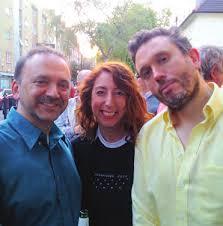
[Above Matt Fitton, Jenny T Colgan, and James Goss]
Responsible for bringing the stories to life has been script editor Matt Fitton, who has written Technophobia, the first of the Big Finish Tenth Doctor stories, as well as working with the other scribes on the series. Jenny T Colgan has written Time Reaver, while Death and the Queen has come from the imagination of James Goss.
(Full Article Under Cut)
Talking of this series, Matt says: “It had a long gestation period – when the licence first came through, we started thinking about different ways of doing Tenth Doctor stories.
“When it became clear we had Donna as well, we sent a pitch to be approved by the BBC, so we could give them a concept of what we wanted to do, story-wise.
“We decided to do something similar to the way they did things with the TV series. The first one was going to be a story set in contemporary London with a strange threat, so it was similar to a series opener of the era. The second story would be set in outer space, with something weird, wonderful and alien, and then the third story would be something possibly historical or a bit more emotional and based on Earth.
“These were the briefs that want out to Jenny and James, so they were able to flesh out their stories. We had lots of exchanges of ideas, back and forth.
“James is a good, solid, clever writer who you know you can rely on. I was really pleased to get Jenny involved as we were keen to have something of a name attached to the series, and she is such a good writer who loves her Doctor Who too. It’s great to have a Sunday Times best-selling writer with us!”
In order for Matt to get the feel for the era again, he had to dig out his DVD collection.
In Technophobia, the Doctor and Donna visit London’s Technology Museum for a glimpse into the future, but things don’t go to plan. The most brilliant IT brain in the country can’t use her computer. More worrying, the exhibits are attacking the visitors, while outside, people seem to be losing control of the technology that runs their lives. Is it all down to simple human stupidity, or is something more sinister going on? Beneath the streets, the Koggnossenti are waiting. For all of London to fall prey to technophobia...
Smiling, Matt says: “It was a question of going back and watching the episodes again, which is what I do with the classic series. You watch the episodes and how the characters work – the Doctor and Donna are just such vivid characters, as they are so full of life on screen.
“I suppose there’s an added pressure knowing you’ve got David and Catherine performing your lines. Everyone knows Catherine’s a brilliant comedian and some people forget just how great an actress she is too – you want to give her something to really work with.
“You know David’s so good and will be able to do anything you give to him.”
David Richardson says: “Technophobia began life as something else altogether. I’d been holding on to the idea for a story about sleep deprivation – what would happen if the whole world lost the ability to sleep? That was going to be our first episode. And then we submitted it to Cardiff, and of course Sleep No More was planned for series nine on television, so there was a clash. Matt Fitton rather brilliantly took the core idea and twisted it into something else entirely different but really clever.”
“Everyone knows Catherine’s a brilliant comedian, and some people forget just how great an actress she is too – you want to give her something to really work with.”
– Matt Fitton
Time Reaver

[Above Jenny T Colgan wearing an “I 'heart heart' Gallifrey” t-shirt.]
The second adventure for the Doctor and Donna is Time Reaver. Although Jenny – an accomplished romantic comedy novelist as well as a prolific writer of Doctor Who fiction – has since written a play for Big Finish’s first River Song series, which was released earlier this year, she actually wrote her Tenth Doctor story first.
In Time Reaver, the TARDIS lands on Calibris, the spaceport planet where anything goes. The alien Vacintians are trying to impose some order over the smugglers and pirates that crowd the port. Soon the Doctor and Donna discover why. An illegal weapon is loose on the streets. A weapon that destroys lives... Slowly and agonisingly. The Time Reaver.
Despite having written for the Doctor several times in prose – including In The Blood, a new Tenth Doctor and Donna BBC novel being released this month to tie-in with the Big Finish audios – this was Jenny’s first script, a fact she was extremely excited about.
“I never believed that people actually jump for joy but I did actually hop around the kitchen a little bit. Then I was so terrified I’d actually tell someone I got horribly paranoid. But it was an extremely exciting moment.
“I pitched a few things and they chose the one they liked. Funnily enough, Time Reaver is quite traditional sci-fi – it’s a mechanical interchange planet, like a massive interplanetary King’s Cross – whereas my friend and colleague James Goss has written one about Donna getting married, so it feels a bit like we’re on each others’ turf!”
Jenny didn’t feel the need to go back to watch some TV episodes featuring the Doctor and Donna.
She explains: “I’ve written for four different Doctors and you do have to shake their voices out of your head a little bit, just to give yourself a bit of a mental shake up because they’re all so different. Matt Smith is nothing like Peter Capaldi who is obviously nothing like David, etc. The Tenth Doctor understands human emotions, whereas the Eleventh gets a bit bamboozled by them, and the Twelfth understands in theory but he doesn’t really care very much – although he’s learning...
“But I don’t need to go back and watch series episodes, I watch them all the time. I can recite Forest of the Dead off by heart (I shan’t, but I can). Silence in the Library is a real touchstone for me. I have two Tenth Doctor/Donna projects coming out in May: one is set just before Library and one just after Midnight.
“Here is a funny thing; my kids were watching Silence in the Library last week because the six- year-old is finally old enough to deal with the skeletons, and when River says ‘Have we done picnic at Asgard yet?’ (which I wrote this year for the Eleventh Doctor and River), they all turned to me and went ‘But how did you know?’ And then when he says ‘Why would I give you my screwdriver?’, they all went, ‘Because mummy wrote that you had a sonic trowel and the Doctor thought it was rubbish!’.
“It was just so, so very lovely to be able to play with all of that when you’re writing for Doctors past, and so very special to me.”
Death and the Queen

[Above James Goss holding a cat.]
The concluding play in this first run of Tenth Doctor adventures is Death and the Queen, by James Goss. As we’ve seen in The Runaway Bride, and learned subsequently, Donna Noble has never been lucky in love. So when, one day, her Prince does come, she is thrilled to have the wedding of all weddings to look forward to. The Doctor isn’t holding his breath for an invitation, and her future mother-in-law is certainly not amused. But on the big day itself, Donna finds her castle under siege from the darkest of forces, marching at the head of a skeleton army. When it looks like even the Doctor can’t save the day, what will Queen Donna do to save her people from Death itself?
James explains how the conversation went when he was asked to write the play: “David Richardson: ‘This is obviously top secret and you can’t tell anyone’.
“Me: ‘I think I’ve just told a whole train carriage’.”
James is no stranger to writing for the Tenth Doctor – his BBC Audio play Dead Air, read by David Tennant, was voted 2010 Audiobook of the Year. The award was selected by voters visiting the Audiobook store. It beat other books nominated including Adrian Mole: The Prostrate Years, Othello, Animal Farm, Shakespeare in Love and War Horse.
James wasn’t given much of a brief for this tale, as he says he was given: “Not much really. Just keep the Doctor and Donna together as much as possible and have them having a great amount of fun. Which I hope they do. “I had another idea which is also amazing!”
With the script having been finished months before it was actually recorded, has it been a nervous wait for James?
“Not really. So often these things are a tearing hurry, but this was a nice sense of it sitting on a shelf, gently maturing. I re-read it the night before the recording and sweated fear.”
And is he excited to hear the finished play?
“VERY. How else does anyone answer this? Donna Noble is getting married again. The Tenth Doctor’s trying to help. What could possibly go wrong?”
“So often these things are a tearing hurry, but this was a nice sense of it sitting on a shelf, gently maturing. I re-read it the night before the recording and sweated fear.”
– James Goss
Russell T Davies
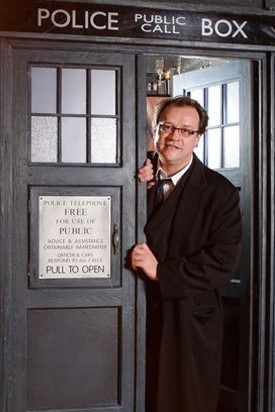
[Above Russell T Davies in the doorway of the TARDIS.]
Another person who’s particularly looking forward to hearing the plays is former Doctor Who executive producer Russell T Davies. He created both the Tenth Doctor and Donna, and in his role on TV, he oversaw every single word which came out of their mouths.
In an exclusive interview with this magazine, Vortex asked him how odd does it feel, that a part of his time on Doctor Who is now being brought to life on audio by Big Finish?
He says: “Actually, yes, good question, because odd is the right word. Along with wonderful and exciting and brilliant. But I pored over every single word the Doctor and Donna ever said to each other – apart from Steven Moffat’s two-parter, I probably wrote most of their dialogue – so to not know what they’re going to say next is a little bit strange. Just a little bit! In a good way. But really, I can’t wait to hear those two actors riff off each other again. David and Catherine are such good friends in real life, there’s a genuine spark between the Doctor and Donna.”
Russell wasn’t involved with the storylines?
“Not at all!”, he says. “Well, they ran them past me in simple synopses, but it’s Big Finish, they know what they’re doing. And besides, you can’t make these things with someone sitting far away, trying to meddle. It’s a Big Finish licence, so it’s a Big Finish show, it’s their version of the Doctor and Donna. And that’s Big Finish’s speciality – recreating eras faithfully but always finding something new to say.”
And how excited is he to hear some new stories, being brought to life by David and Catherine?
“Very! Those two, back in action, after all these years, it’s an absolute joy. Just the other day, I was in Superdrug, and the woman at the till asked if I wanted a bag, and I said no, I’ll put it in my pocket, and she sighed wistfully and said, ‘Women don’t have pockets.’ And it made me think of Donna! I laughed to myself for about 10 minutes afterwards, remembering Donna’s line about getting her wedding dress from Chez Alison. It made me think how much I miss her. And bang on cue, here she is, back again! And I don’t think a single day passes without someone telling me how much they loved David as the Doctor. It’s an honour to get him and Catherine back together. Yes, I’m excited!”
“Those two, back in action, after all these years, it’s an absolute joy.”
– Russell T Davies
– VORTEX Magazine, Issue 87, Pages 6-15
The Tenth Doctor Adventures: Volume 01
Technophobia
London’s Technology Museum faces a revolution. Is it all down to simple human stupidity, or is something more sinister going on?
Time Reaver
An illegal weapon is loose on the streets of spaceport planet Calibris - and the Vacintians are closing in…
Death and the Queen
The Wedding of all Weddings comes under attack by a skeleton army. Can Queen Donna save her people from Death itself?
Written By: Matt Fitton, Jenny T Colgan, James Goss
Directed By: Nicholas Briggs
Cast: David Tennant (The Doctor), Catherine Tate (Donna Noble), Niky Wardley (Bex), Rachael Stirling (Jill Meadows), Chook Sibtain (Brian), Rory Keenan (Kevin), Jot Davies (Lukas), Alex Lowe (Soren), Sabrina Bartlett (Cora), Terry Molloy (Rone), John Banks (Gully), Dan Starkey (Dorn), Blake Ritson (Rudolph), Alice Krige (Queen Mum), Beth Chalmers (Hortense), Alan Cox (Death)
Available as deluxe five-disc box set, limited edition of 5,000, and as individual vanilla releases.
For full details visit www.bigfinish.com .
#vortex magazine#big finish#doctor who#the tenth doctor adventures#david tennant#catherine tate#the tenth doctor adventures: volume i#technophobia#matt fitton#time reaver#jenny t colgan#death and the queen#james goss#russell t davies#becca posts#article#issue 87#interview#these are those small articles i moaned about yesterday#quite interesting#but why put them in the middle of the main article?#anyway#i still haven't managed to figure out how to extract images from a pdf#so sorry for the low resolution on some of the photos#they were the best that google could come up with#and a small disclaimer regarding the rtd photo#the one in used in the original article was taken from a different angle#but i couldn't find it anywhere#...
2 notes
·
View notes
Photo
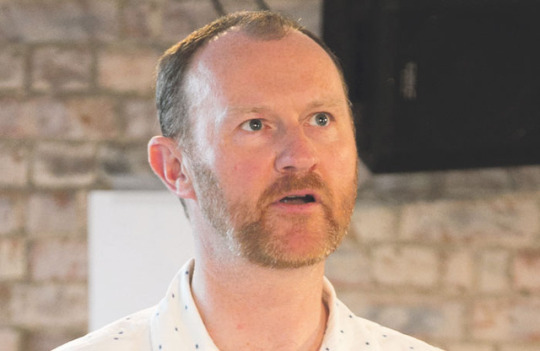
Mark Gatiss: ‘There’s nothing quite like the sheer bloody terror of theatre’
by
Mark Shenton
- Sep 29, 2016
By a strange sort of coincidence, October sees Mark Gatiss, Reece Shearsmith and Steve Pemberton all appearing on the London stage.
No sooner does Gatiss open next Tuesday in The Boys in the Band at the Park Theatre, than the very next night Shearsmith begins previews for a West End revival of Ronald Harwood’s The Dresser, and three weeks later Pemberton leads the cast of Dead Funny. The three men were, of couse, all co-founders (with Jeremy Dyson) and stars of The League of Gentlemen, a TV comedy troupe that was born as a stage act (and won the Perrier comedy award at Edinburgh in 1997), before making three TV series between 1999 and 2002 and then a feature film in 2005.
“This is a sort of two-yearly story now, when we all seem to be doing plays at the same time,” says Gatiss, talking in a lunch break from rehearsals a couple of Saturdays before previews begun. “But we’re just working really.”
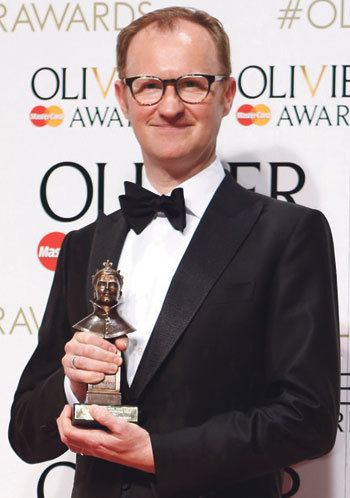
Today he tells me frankly: “I owe everything to the League – and we’re talking about doing something else now, as it has been 10 years since we worked together and we’d love to again.” Yet it also keeps reappearing in his life anyway: “It goes in cycles of rebirth. People come up to me and say they loved it when they were kids, which makes me feel ancient; but then kids come up to me who’ve just found it, too. It goes round and round.”
During those League years – “we were together for 11 years” – he and the others made a total commitment to it. “We made a pact that we wouldn’t get distracted. We’d seen a few of our contemporaries go off and do other things, but we didn’t want to lose sight of what we were doing, so if we did anything else it would be only short things that we could fit in.”
If the League will forever be a marker for him, another has become Sherlock, the modern version of Sherlock Holmes that he has written with Steven Moffat, and for which they’ve just completed a fourth series of three episodes.
“That takes it to 13 we’ve done in six years. People ask why we don’t do 10 a year, but it’s hard enough doing three every 18 months. It’s a once-in-a-lifetime thing, like bottled lightning; it just came together, the idea of doing a modern version, the writing, the casting and the timing of it. Conan Doyle spent all his life trying to work out why people liked Sherlock Holmes; Steven and I just go, ‘fine’. It’s been astonishing; it sells to more places than there are countries, which is something to do with oil rigs and other territories. And Benedict [Cumberbatch] and Martin [Freeman] have become superstars through it.”
Gatiss is himself far too modest and self-effacing to consider himself a star, though as an actor earlier this year he won his first Olivier award for best actor in a supporting role for his appearance in Three Days in the Country at the National Theatre, and said in a post-award red carpet interview: “I’m over the moon, I really am. It’s a thrill, I’ve always wanted one and I am really pleased.”
https://youtu.be/0cAIHJ6f6zQ
He had every reason to be; as Kate Kellaway put it in her review in The Observer: “Mark Gatiss, as the ‘maestro of misdiagnosis’ Shpigelsky, gives a comic tour de force, and his immodest proposal to middle-aged Lizaveta brings the house down. He sinks to his knees to propose, but lumbago prevents him from rising and he crawls, in a most undignified style, across the stage, bottom up. It’s funny, but it is the more subtle aspects of Gatiss’ performance that fascinate most: the way he holds a smile, lets it go beyond its sell-by date: there is Shpigelsky’s vanity and misplaced confidence in it.”
He tells me he never had confidence in that comic routine himself: “Una Stubbs once told me that when she was doing a play at the Donmar Warehouse a friend told her how she loved that thing she was doing with her hands, and she never got a laugh from it again after that. It’s the old saw about a good review being as dangerous as a bad one. With the entire back routine in Three Days in the Country, I couldn’t remember what I had done about three months in; I lived in mortal dread of it going away, but it was also good because it kept it fresh.”
He keeps himself fresh by combining two careers, one as a writer, the other as an actor. “I’ve always done both. In an ideal year, I do half and half. Sherlock takes a long time to write, then four months to film; I then like to spend three months on a play.”
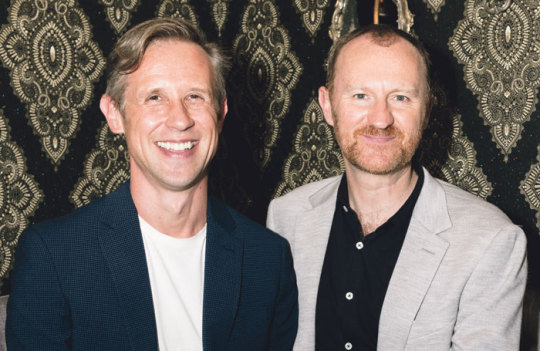
Theatre has become a mainstay for Gatiss. “I usually do a play a year, sometimes two,” with credits that stretch from the National (where as well as Three Days in the Country he also starred in Alan Ayckbourn’s Season’s Greetings) to the Donmar (The Recruiting Officer, Josie Rourke’s first show at the helm), Hampstead Theatre (Howard Brenton’s 55 Days), and London’s Old Vic (All About My Mother). “I can write while I’m in a play, too, and I like that – it gives structure to the day – but I always forget, like the amnesia of childbirth, how tired I get. When you do a play you shift into a different pattern, and become more of a night owl, although I’m very much a morning person. When you’re in the theatre, you eat late and sleep later so that has an effect on the day.”
Theatre has also always been in his blood, ever since he first attended a drama club at school and an after-hours youth theatre, before going to study at Bretton Hall in Yorkshire, where he first met the other Leaguers and they formed The League of Gentlemen. “It’s such a different experience to sitting in a caravan waiting to film something. There’s nothing quite like the sheer bloody terror of theatre – and the smell of a freshly painted set is exactly the same wet paint smell I remember from drama club at school. It gives me the same tingle of anticipation and nerves and excitement.”
Being in a play is like a holiday romance – it’s very intense, then it dissipates
Of course, one of the joys of working in the theatre is that it is much more social than the solitary act of writing. “Sometimes I feel like I’ve been chained to a desk for months, so there’s nothing nicer than joining a new group of friends and everything that comes with it. It’s like a holiday romance – it’s very intense, then it dissipates.”
There’s no room for holiday romances, or ‘showmances’ as I’ve heard them dubbed, though: for the first time, he is working on stage with his actor husband Ian Hallard, whom he married seven years ago. “We’ll be like Michael Denison and Dulcie Gray now,” he quips. The ceremony was held at Middle Temple, the ancient Inn of Court in central London, and he can’t resist telling me: “The ceremony took place beneath the portrait of Edward Carson, the man who prosecuted Oscar Wilde. Who’d have thought? He’d be turning in his grave.”
Doing The Boys in the Band, Mart Crowley’s 1960s play about a group of gay men, together now was prompted partly by Hallard’s involvement in a rehearsed reading of the play four years ago, which Gatiss saw and tells me how much it resonated.
“One line that stood out was: ‘If we could only not hate ourselves quite so much.’ I thought it was brilliant. And then [producers] Tom O’Connell and James Seabright got a production together and the Park Theatre said yes, and I had a gap, so I joined, too. Ian was doing Cat on a Hot Tin Roof at Theatr Clwyd in the first three months of the year, and then I went straight off to do four months of Sherlock, so this is a good way of seeing each other now.”
There are other perks, too: “Jack Derges is utterly delightful – being kissed by him every day is all right. But Ian gets kissed by him first,” he hastens to add. The Park is also local to them – they live in nearby Islington – and he says: “I love this theatre. It has an indie feeling to it, and has a really loyal, local audience. But I’ve also wanted to play this part since I saw the film when I was 12 or 13. It’s an important play – it’s fascinating to see where we were, where we’ve got to, and between that, where we think things have changed or not at all. You know that a play is good when you stage it at different times and it means something different each time.”
Continues…
Q&A: Mark Gatiss
What was your first non-theatre job? I worked as a gardener in a hospital across the road from where my dad worked.
What was your first professional theatre job? Working at Darlington Arts Centre, now sadly gone, which in its day was second only to the Barbican in terms of size. I was a deputy stage manager.
What is your next job? I’ve got a lot of things to write, most of them secret at the moment.
What do you wish someone had told you when you were starting out? Don’t sweat the small stuff.
Who or what was your biggest influence? My greatest inspiration is Alan Bennett – I’ve never worked with him, but he is it. My acting hero is James Mason, who as a screen actor was unsurpassable; on stage, it is Mark Rylance – his Richard II was a life-changing experience for me, it was breathtaking.
What’s your best advice for auditions? Don’t go, leave them to me! But apart from that, whenever I’m involved in producing things, I try to get actor friends to come in and read in for those auditioning. It’s very unusual for actors to sit on the other side of the table, and they always find it revelatory. At the end of the day, they realise it is very rarely about not being good, but about the fit, and that’s reassuring to know. So my advice would be that if you can, try to get to sit on the other side of the table sometime – it will make you feel so much better when you don’t get a job.
If you hadn’t been an actor and writer, what would you have been? I’m very blessed to do this as I can’t do anything else. The only other thing I really wanted to was be a pantologist, but I didn’t have Latin.
Do you have any theatrical superstitions or rituals? I try not to as I’m quite a rational person, but in the face of the terror, I can’t tell you how many times I find myself whistling in the dressing room and having to go out in the corridor and turn around three times and blow a raspberry, hoping no one notices.
He goes on: “There is a lot of stuff in this play about self-loathing that is very relevant. The idea that that has gone away is a fallacy. The levels of mental illness and suicide in young gay men particularly is awful. I was talking to a friend recently who told me about a friend of his who struggled to come out. We imagine, living in our metropolitan bubble, that it is easy, but he had gone through hell – it sounded like something from the 1950s, but was to do with what was going on in his own head.”
The play premiered in 1968, a year ahead of Stonewall and the new age of gay liberation that ushered in, but it was a landmark play for portraying gay lives on a mainstream stage so unashamedly, and maybe critically. Some activists have resisted its portrait of these gay lives as too hostile and unhappy; but as Gatiss points out: “I hate the notion of things having to wear the weight of everything on their shoulders. This is actually a particular view of nine particular men, written from a very autobiographical standpoint by Mart Crowley. I feel very like I’m on a soapbox about this, but why should this play have to shoulder everyone’s stories? Obviously it was different when there were very few gay plays, but it’s not like that now that there’s a multiplicity of them, so we can look at it in its context.”
Photos: Tristram Kenton1 of 4
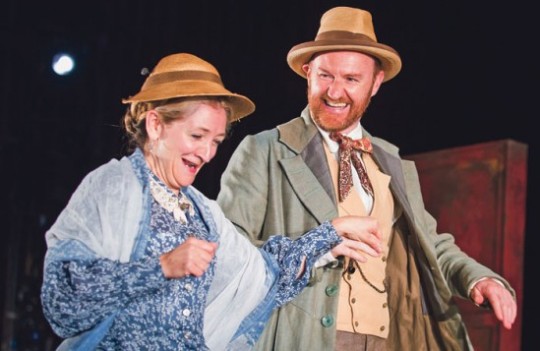
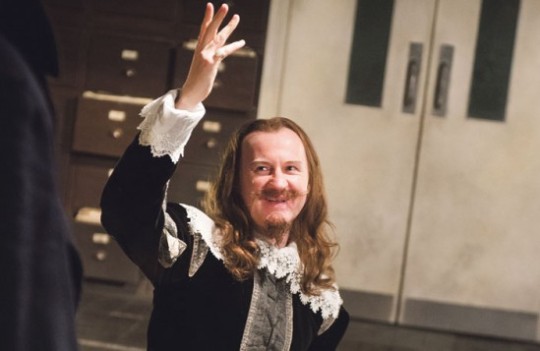
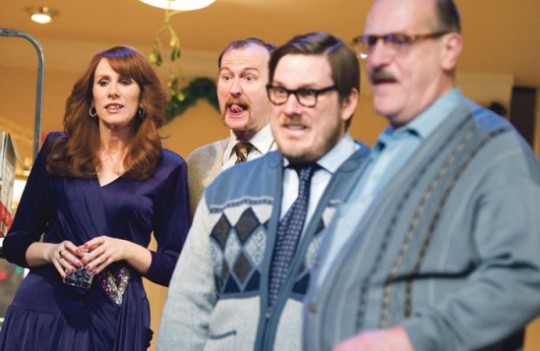
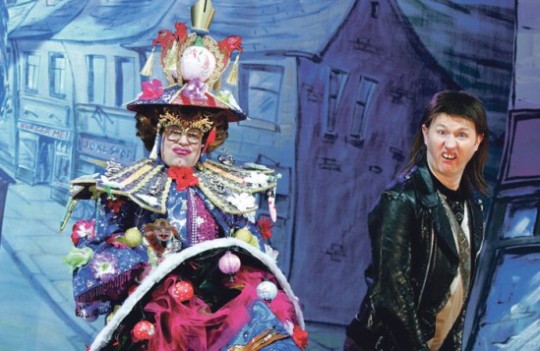
That context is also, of course, pre-Aids – though it’s a sad fact of that disease that it claimed no fewer than four of the play’s original New York cast. During the 1980s, the play duly fell off the gay theatre syllabus entirely; as Gatiss puts it: “There was a period when clearly this was the wrong thing to put on, when we were absolutely under siege. But the last time it was done in New York, Ben Brantley wrote in The New York Times that it was apparently all right to like Boys in the Band again. As time passes and things shift, it is not just ripe for revival, but also still relevant. It’s a false assumption that all battles have been won. There’s a massive debate in the gay community about masculinity, for instance. And what really interests me is the notion how, in any community or cause, when you start to achieve victories, the things that give you common cause start to fray and then you start to turn in on yourself. It’s a bit like the Labour Party is doing now. But so much has been achieved.”
Yet the gay community is facing new challenges now, such as the disturbing rise in chemical drug addictions. “A friend has a really interesting theory about the perhaps subconscious feeling among gay people that we are somehow ‘other’. There’s that wonderful line in Inherit the Wind that you invent the telephone but lose the charm of distance; so for everything you gain, you lose something, too. And maybe the rise of chem-sex is a way for men to say, ‘Yes, I can marry and adopt children now, but I’m still not like you.’ And that’s really interesting.” Addictions are a way to try to cure, or at least temporarily relieve, pain, “whether it’s drugs or sex or booze, which this play is about. And from the outside, all looks fine now – you have Craig Revel Horwood and Bruno [Tonioli] on the TV, and Ian and I were on Graham Norton [on BBC Radio 2] this morning, so visibility is not an issue. Obviously huge steps have been made, but it’s folly to think that everything is rosy now.”
Continues…
Mark Gatiss’ top tip for an aspiring writer and actor
• As Churchill said, keep buggering on, that’s the only thing you can do. For writing, there’s no such thing as a would-be writer. You do it or you don’t, so just get on with it. People are scared, they think they’ll be judged – but the only person doing that is yourself.
Some may still resist the portrait of these bitching, unhappy gay men all over again, but Gatiss is ready with his answer to them: “If someone says that’s not me, it’s not supposed to be. I find repellent the closing down and over-policing of things; it suffocates debate.” That’s a debate he wants to have. And apart from working with his husband, the play has an added resonance for him, too: in it, he plays Harold, whose birthday party provides the setting for the story, and he tells me, “I’ll turn 50 during the run, though we don’t have a show that night.”
After the run finishes, he plans to take a holiday at last: “I’m going to try to have an actual month off, to see if I can do it. People ask me if I’m a workaholic – I don’t think I am, but I love to work. Noel Coward once said work is more fun than fun, and I finished a script the other day and gave myself a day off work and I went off for a massage. But I was quite bored by the end of the day.”
CV: Mark Gatiss
Born: 1966, Sedgefield, County Durham Training: Bretton Hall College Landmark productions: All About My Mother, Old Vic, London (2007), Season’s Greetings, National Theatre (2010), The Recruiting Officer, Donmar Warehouse, London (2012), 55 Days, Hampstead Theatre, London (2012), Coriolanus, Donmar Warehouse, London, with Tom Hiddleston (2013), Three Days in the Country, National Theatre (2015) Awards: Perrier award for comedy for The League of Gentlemen at the Edinburgh Festival Fringe (1997), BAFTA for The League of Gentlemen TV series (2000), Royal Television Society award for The League of Gentlemen TV series (2000), Golden Rose of Montreux for The League of Gentlemen TV series (1999), Writers Guild award for best short-form TV drama for Sherlock (2012), Olivier award for best supporting actor for Three Days in the Country (2016). Agents: Sarah Spear/Grace Clissold at Curtis Brown
The Boys in the Band runs at the Park Theatre, London, until October 30
7 notes
·
View notes
Text
Zanzibar - Inside No. 9 blog
(SPOILER WARNING: The following is an in-depth critical analysis. If you haven’t seen this episode yet, you may want to before reading this review)

One of the marvellous things about Inside No 9 is that you never know what you’re going to get from one episode to the next. I never would have expected Steve Pemberton and Reece Shearsmith to write an entire episode in iambic pentameter, but here we are. Zanzibar. An amazing opening episode that can only be done in a show like Inside No 9.
Set on the 9th floor of the Zanzibar hotel, the episode opens with the bellboy, played by Jaygann Ayeh, introducing the audience to the story, which was a bit unexpected. We’ve never had narrators in the show before (the closest we ever got was Derek Jacobi in The Devil Of Christmas). Then things got slightly more disconcerting when Reece Shearsmith himself broke the fourth wall. By the time Bill Paterson started doing it, it all became clear. This is Pemberton and Shearsmith’s ode to Shakespeare.
Now of course this isn’t the first time Pemberton and Shearsmith have tried Shakespeare. Series 1′s The Understudy took a lot of its influence from Macbeth, even going so far as to use the play itself as a narrative framing device. But I personally feel Zanzibar works much better. For one thing, the plot elements and parallels are far less contrived here than they were in the Understudy. Also, mercifully, it doesn’t feel like the writers are constantly bashing you over the head with their cleverness. Instead they just let the work speak for itself. Zanzibar is still immensely entertaining if you’re not familiar with the bard’s work, but those who have at least a passing knowledge of Shakespeare and his plots will derive so much more from it.
Zanzibar is ostensibly a Shakespearean farce and it contains a lot of the plot elements and devices one would find in a Shakespeare play. There’s the case of mistaken identity with Rory Kinnear’s characters, a lovers’ quarrel, the servant trying to usurp his master, a sleeping draught, a love spell, family rivalries and political machinations. Not to mention tons of sexual innuendo and smut and, to cap it all off, the fool (or in this case the bellboy) being the only character smart enough to understand what’s going on around him while those of higher social status than him get lost in their own confusing affairs. It’s classic Shakespeare through and through, but still unmistakably Pemberton and Shearsmith.
All the actors do an amazing job in their roles. Rory Kinnear is brilliant in his dual roles as a royal with questionable sexual tastes and the gormless but well meaning working class boyfriend. Bill Paterson too is a highlight. A man desperately trying and failing to commit suicide feels like a typical example of Pemberton and Shearsmith’s trademark dark humour, but the Shakespearean dialogue gives the character a bit more nuance and depth, revealing him to actually be the long lost father of the Kinnear twins, and Bill Paterson really gives the part a lot of emotional welly. But my favourite in particular is Marcia Warren who got some of the biggest laughs from me. This isn’t the first time i’ve seen her play the barmy old woman (she was also Penelope in Vicious), but she does it so well that you can’t help but love her.
A lot of critics have described this episode as being a parody or lampooning of Shakespeare. I disagree. Yes it’s often vulgar and crass, but people forget Shakespeare often dealt with very risqué topics. What’s Much Ado About Nothing if not a farcical sex comedy? I never got the impression that Pemberton and Shearsmith were in any way mocking Shakespeare. In fact kind of the opposite. There’s a long tradition of theatre, film and television adapting Shakespeare plays in a more modern setting whilst retaining the original, poetic prose and Zanzibar feels very much in that vein. It’s a tribute to Shakespeare, demonstrating how timeless the themes of his stories are. The only time the episode ever makes fun of it is in a very playful, self aware way. For example when Marcia Warren’s character gets her memory back and asks what had just happened, and her son (played by Pemberton) replies that it would be impossible to explain in a rhyming couplet.
What’s most notable about Zanzibar is that it actually has a happy ending. Bill Paterson is reunited with his sons, the assassination attempt is foiled by a hypnotist and the hokey kokey, Marcia Warren gets her memory back and Rory Kinnear’s relationship with his fiancé is rekindled. It makes a pleasant change from the twisted and macabre settings of previous stories. There’s also no real twist as such. One of the reasons I felt Series 3 was slightly weaker than the previous series’ was because Pemberton and Shearsmith had fallen into the same trap that a lot of other writers like Steven Moffat and JJ Abrams have fallen into. Putting more emphasis on trying to shock the audience rather than telling an engaging story. That’s how you end up with stories with twists that undermine what came before (The Bill) or that are so outlandish that the entire episode starts to become pretentious and convoluted (The Riddle Of The Sphinx). With Zanzibar, the focus is clearly placed on creating a funny and entertaining story with interesting characters in a compelling style, and it’s all the better for it. Zanzibar is an episode that rewards repeat viewings. The intricacies of its story and the attention to detail is what makes this stand out so much. Character arcs and plot elements are subtly seeded throughout with such skill and confidence, like Shearsmith’s character planning to use his attendance at the hypnotist’s performance as an alibi for himself only for that same hypnotist to be the one who defeats him.
Zanzibar is by far one of the most creative and well executed Inside No. 9s ever written and sets the bar incredibly high for the rest of Series 4.
20 notes
·
View notes
Note
Do you really believe that mofftiss know what they're doing? I mean, I hope so... but sometimes I can't believe it.
It really is a hard idea to stick to, Nonny, I totally get it.
Here are the things that help me keep the hope alive (settle in, folks, I’m about to go on a tangent):
First, S1 & S2 (and I’d argue at least some of S3) were so well done, crafted with such care by everyone involved. Gatiss and Moffat are such fanboys it is ridiculous, and I don’t think we should forget that we fell in love with this show and these characters in the first place thanks to them.
Second, I personally think it’s par for the course for show runners to keep fans in the dark. I know Mofftiss are sometimes arseholes in how they go about it, but they obviously need to keep the element of surprise (especially if they’re doing something that is truly groundbreaking and never-before-seen-on-tv like they claimed they were ::cough:: Johnlock ::cough::). They can’t tell us what they have planned, and this is not unique to these writers, this show, or the BBC.
Third, I think that the show is following a five-act structure. We’ve witnessed the good times, and now this is the crisis/conflict stage, after this comes resolution/happy ending. Read more about how this is a 5 act show here in @toxicsemicolon‘s most recent meta.
Fourth, there are too many coincidental loose ends that can’t possibly be accidents, like in HLV -- Molly tells Sherlock after he is shot: “It’s not like it is in the movies. There’s not a great big spurt of blood and you go flying backwards.” Yet that is literally exactly what happens to Mary when she is shot in T6T (the very next episode). Why would they do that unless they want to raise red flags for the viewers. It was almost comical how overblown Mary’s bullet wound was, and that was on purpose. So... why?
Same thing with the skull painting. The same painting has been a prominent mainstay of the flat at 221b for 3 seasons/series and suddenly in S4, it glows and changes colors and sometimes is completely black. Why? Mofftiss claims that it’s budget constraints with the original painting’s artist, but in the same exact series they were able to afford to film two helicopter scenes and rent an Aston Martin? I don’t buy it. There’s a reason.
We’re lucky to have a fandom full of brilliant people who like to pull at those threads and unravel the nonsense. Check out the blogs of @inevitably-johnlocked, @monikakrasnorada @mrskolesouniverse @raggedyblue @sarahthecoat @fellshish @heimishtheidealhusband @may-shepard @toxicsemicolon @marcespot @marcelock @jenna221b @tjlcisthenewsexy @consultingidiots @shylockgnomes @patiencegrenade @possiblyimbiassed @ghislainem70 @ebaeschnbliah and @sagestreet (and I’m forgetting tons, my apologies!) for some great insights and discussions.
Ever since I discovered meta I’ve been sure that there is something more meaningful coming.
If nothing else, there are too many coincidences to be accidental. Just a few examples (I could go on for days... don’t tempt me)
In TLD, Culverton Smith says (of getting away with murder) “You don’t build a beach if you want to hide a pebble; you just find a beach!” and then in the very next episode, Mycroft tells Sherlock about Eurus while flashing back to a beach covered in pebbles (which they shipped in for that scene) and then holding a pebble, which he drops onto the beach. Read more in @finalproblem‘s amazing meta here.
In TFP, the patience grenade explosion in 221b was powerful enough to blow John and Sherlock out a window (and according to Mark Gatiss, “boop they’re fine” cuz they bounced off the thin awning of Speedy’s cafe, which must also heal burns and scrapes and bruises but whatever), but it didn’t burn paper or half the things in the flat. It DID, however, destroy John’s chair. The chair that they replaced it with? John’s chair from TAB. From Sherlock’s 1800s mind palace. Arwel Wynn Jones has confirmed this.
This tale from Sherlocked Con of a discussion with Wanda Ventham from @fleurdebee legitimately haunts me.
Comments from the cast and crew that don’t make sense yet... including Louise Brealey’s tweet about Chekov’s gun
Speaking of which, you should read all of @toxicsemicolon‘s other astoundingly brilliant meta including Poetry or Truth?
Set designer Arwel Wynn Jones has trolled us (or given us clues?) many times, namely referring to elephants (”the elephant in the room”), but also the skull painting (more skull fuckery here).
Here’s a solid list of questions that @snycock came up with for Sherlocked UK that either prove that the whole cast and crew went through some sort of collective insanity for TFP, or there’s something more coming and things don’t make sense for a reason (which is what I think)
“The Lost Special”
“Mirrors” (where one character stands in for another in a scene, like Molly for John, or Culverton for John, etc.)
Imagery of both burning/fire and drowning/water
Check out my tags for more meta, it’s incredible what this fandom discovers. Most of my meta is tagged under #hope for s5 #what fresh fuckery is this #I believe in mofftiss
Ok, I’m starting to get incoherent and my browser just crashed all my tabs so I’ll leave it at that. The meta rabbit hole is deep and wide and curvy and I could probably fill a book filled with just links to other people’s brilliant findings.
I guess the main takeaway I want to leave you with is this:
I don't think two men who cared so much about this show for so long would chuck it into the toilet for no reason. The same brilliant minds that gave us villains like Moriarty, Culverton Smith, and Magnussen suddenly giving us an improbable two-dimensional psychopath in Eurus makes no sense. TFP itself makes no sense in about 100 different ways. And I don’t think any of that was an accident.
More is coming. When the Garridebs story is finally free of copyright, we’ll get our resolution. I don’t know which theory I believe but there are so many... that Eurus shot John and TFP is his dying hallucination, that Sherlock is still in his mind palace (possibly since HLV, or even earlier), that the whole thing is us seeing events through John’s blog (which was commissioned by the BBC yet often conflicts with canon), alibi theory... who knows. I’m happy to point you toward more meta, but I think the blogs I mentioned above and some of the links should start you on your way. Once the evidence starts to stack up, it’s clear... we don’t have the whole picture yet.

217 notes
·
View notes
Text
“Cover it up”: Ragnarok and the scars of history (2/2)
Find part 1 here
“It is I! Your saviour!”
So: hands up, those of us who were shocked/thrilled/horrifically excited etc when we were first presented with the prospect of seeing Loki on Asgard’s throne.
And now: hands up, those of us who were expecting what he actually did with it.
Loki’s a difficult character to deal with, largely because his motivations seem to be all over the place. In The Avengers he wants world domination and to not be killed by Thanos. In The Dark World he wants revenge for his mother and, in some small way, to get on a little better with Thor. These things, they don’t really line up, do they? And that leaves us, after all these films, still asking that question: what does Loki want?
When Loki took over Asgard, he didn’t take its armies on a campaign of conquest through the galaxy. He didn’t hunt down his enemies or murder his brother or invade Earth. He sat on a sofa and ate grapes and commissioned art in honour of himself – in honour of Loki, hero of Asgard, beloved of his father, forgiven of his crimes. Loki took over his country and then he took what he wanted: the love of Asgard’s people, his place in its history. Given the chance to have anything he wanted, this is what he chose. To be loved. To be accepted. To be remembered as one of them.
This, then, is what Loki wants: to be a hero of Asgard, rather than an outcast from it. To be someone they accept, not out of force, but out of love. This is, really, what he’s wanted ever since his first appearance – his villainous turn in Thor, after all, began as an attempt to win his father’s approval, and a large part of his snarling bitterness at his country and his family comes from the trauma of realising that neither is really his. Loki is haunted by the feeling of being other; what he wants, more than anything, is to be rid of that feeling.
Read in this light, the appearance of the little blue kid at the end of The Tragedy of Loki of Asgard goes from being just a cute joke to something more significant: a reminder of where Loki comes from, and who he is. Not just an outsider, or an immigrant, but a hostage from a conquered race. If Hela represents the dark, violent imperialism of Asgard’s past, Loki represents the continuing reality of this imperialism in Asgard’s present. The Jotun were not victims of Hela’s violence, but they were victims of an impulse nearly identical to the one which Hela embodies – the impulse to fight, to conquer, to rule.
When I was sixteen I wanted to move to London. I wanted to write for the BBC; I wanted to be the next Steven Moffat. These are all reasonable dreams, when you are sixteen and a Doctor Who fan; to be honest, I still want to be Steven Moffat. But when I was sixteen I wanted more than that – I wanted to move to London and become British, to prove that I spoke English as well as any Englishwoman, to take the accent and the airs and dye my hair and change my passport and get an OBE from the Queen and forget where I came from and have everyone forget about that, too. To be a Singaporean who made good. To go to the people who’d conquered my people and make my place there, as one as good as them, as one of them.
I got older. I got better. I go to university in England now. Now and then I catch myself speaking with my accent from home and I rub it out before anyone else notices. I take the odd slang term and I hide it away. I work hard because I love my degree and I respect my tutors and I never learned how to not work hard when it comes to academia, and I work hard because one day I’m going to get a first and beat all my white brit friends and I’ll prove that I’m as good as them even though I’m Chinese. It kills me that there are cultural jokes my friends share with each other that I will never understand. It kills me that there is a form of humour over there that I was not raised to appreciate. I go to university in England now and I love that land and I love this land, here, where I came from, but it’s hard being home in two places, it’s hard being made in one and living in another, and sometimes that kills me too.
The place where I live during term time has been standing for a thousand years and it has a library with every book in the world in it and it is a beautiful city full of beautiful people who speak the language I love perfectly, it is a place of poetry, and home is a city full of squat practical buildings built in the last fifty years and advertisements on buses which have grammatical errors in and every now and then I think to myself if I had to pick one, if I had to pick one…
I am older, now. I am better. I tell myself I love my country. I tell myself I do not need to prove myself to anyone, especially not because they’re white, especially not because they would have been my masters, in another life. I am aggressively Singaporean now, aggressively Chinese, aggressively myself. I am no longer sixteen. Sometimes I catch myself wishing I had been born English. The very idea disgusts me. It’s still true.
When Loki takes over Asgard, he turns himself into Odin to do it. And if you’re anything like me, you thought that would’ve lasted for about as long as it would’ve taken him to quash all dissent, exile the strong and the loyal, and reveal his true self to the quivering, subjugated masses left with no other option than to submit to him. But here he is, years later, and he’s still Odin. He would, it seems, be happy to stay Odin for the rest of his life. Loki, remember, wants to rule, but more than that he wants to be loved. And if he can’t have both as himself, he’s willing to become a person who can. Odin, the symbol of every Asgardian ideal, the man who crushed Loki’s people, the man whose approval he was willing to destroy a world for – why wouldn’t he want to be him? Why wouldn’t he want to stay that way?
The tragedy of Loki of Asgard is this: that he becomes his own oppressor, just like I have become mine. We are the ones who set standards that we are never going to reach. We are the ones who are ashamed of where we come from, who we were, who we are now. We are the ones who look at a race of people we secretly resent and tell ourselves they are superior, that we will never be anything unless we can gain their approval, be like them, be them; we are the ones who will destroy ourselves trying. This is, you see, our own fault. Our own fault. We do this to ourselves.
It’s no surprise, then, that Loki looks a lot like Hela – Hela, the conqueror, the colonialist, creator of empires. They are both tall, thin, pale-skinned; dark-eyed, dark-haired. Both wear horns. Their hairstyles are even similar, and their colour schemes – black and green, almost the same shade. The similarities don’t end there; both share a love of conquest, a desire for power, even certain turns of phrase – in ordering her brothers to kneel, after all, Hela is clearly stealing Loki’s line.
Loki is not just the victim of a history of violence and oppression. He is the inheritor of that history. He’s internalised it, let it take him over; let it dictate who he wants to be and who he is becoming – a creature of conquest, the embodiment of the very thing that did him damage. He becomes both his own oppressor and a symbol of his own oppression – both the victim and the villain of his own story. He takes on both sides of that history. He is scarred by both.
It is Loki, of all of Odin’s children, who has the best claim to Asgard’s history.
Which is, of course, why he gets to be the one to burn it all down.
“Get up. You’re in my seat.”
I just want to say two things about Thor.
The first is this: that Marvel’s filmmakers have finally found, in Thor’s arc in Ragnarok, the one storyline for which the protagonist needs to be a white man. Because Thor is the ultimate child of privilege – raised as royalty, heir to a throne, physically indestructible, with Aryan looks and a traditionally masculine personality. He is, both in-universe and out of it, the white-masculine ideal – the man’s man who oozes physical strength and (hetero)sexual appeal, a man with rank and status and money, handed power and authority on a silver platter. Thor is the one person who never had to fear all the things that Hela represents, because he is not the sort of person she conquers – he is the sort of person she conquers for.
And in this film, he comes to understand what it’s like being on the other side of that picture. This is not, of course, to say that Thor has never suffered before, or that he has never before been capable of compassion for those who are suffering – but he has never, till this point, been the victim of this particular form of violence. Before, he had always been a person with unquestioned agency, the hero of his own story, sometimes hurt but never at another’s mercy. He has been beaten; he has never been exploited. Until now.
In Ragnarok, Thor is enslaved, subjugated, kept in line by thinly-disguised torture. He has his throne stolen from him, his legitimacy questioned. He is used, abused, imprisoned not because he is recognised – as SHIELD recognised him in his first film – as a threat, but because he is property that must be kept in its proper place. He sees his people attacked. He loses his hammer and his agency and his hair – a loss which, though played for laughs, represents the violation of a body that has to this point been presented as absolutely inviolate and inviolable.
In this film, Thor goes from being a child of privilege to being a slave, a member of a victimised community, a sexualised object, a person without bodily autonomy. And because of this, he finally understands what it is to be these things. To be the victim of a system of power over which you have no control. To be the victim of violence which you are unable to fight. To be beaten and pressed down and thumbed under. To be powerless.
This is, ultimately, what makes his defeat of Hela powerful, and meaningful, and possible. Because Thor, as he was before, would never have been able to fight a system of oppression – he would barely have been able to comprehend it. Thor, the Mighty Thor, has no power in a world like this. We do not need mighty invincible champions who reach down from the heavens to save the oppressed. We do not need the child of privilege, given everything, lacking nothing. We need someone who will fight with us. Who feels this pain too. We need someone who understands.
The second thing I want to say is this: Thor is not the firstborn of Odin. Hela is. Thor is not the heir to Asgard’s throne. Hela is. In nations built on violence and cruelty it is not the children of privilege who inherit. It is history. It is violence. It is cruelty itself.
When Hela tells Thor that he is in her chair, she isn’t lying – she’s correct. The throne is hers, and so is the power, and so is the land. She owns it. It is hers. And none of them may remember, but it has always been hers.
And so Thor tells Loki to burn it down. He burns down his home, his life, everything he has ever known. But in the end, he loses nothing, because none of it was ever his, really. It is not his inheritance that he burns. It is hers.
Who really has your power? Who really owns your land? Can you let it live, knowing it feeds something darker and bloodier than you care to remember? Can you really cling to your gilded thrones, knowing you are usurpers, knowing that one day history will rise up to claim its inheritance?
Do you dare to burn it down?
What will you really lose?
126 notes
·
View notes
Note
Whenever I think about River being Mels in those sorts of scenes I just get too sad :( Like, how did she do that for so long and not implode under the emotions???? How??? Thank you for this unexpected pain on this lovely Monday :P But kind of everything in this fandom is just unexpected pain.
I’m publishing this because I just want to splurge some Mels thoughts.
So this ask is because of my tags on THIS gifset from The Big Bang. You have to wonder if Amy wondered how River knew what she was up to in regards to the fez. We now know it’s because she grew up with Amy and the two of them could probably communicate silently (like best friends tend to do) at one point.
I have SO MANY FEELINGS about River being Mels. I don’t think it was explored enough in the show (because Moffat is fucking terrible at continuing on with his plot twists and giving emotional resolutions).
River knows Amy better than anyone (even Rory tbh, because Amy and Mels were best friends with Rory tagged on for a lot of their childhood). And even when she becomes River and goes off and becomes a doctor and gets incarcerated and has her own criminal lifestyle...she still knows Amy better than anyone. But that’s really when Amy stops knowing River...
I think Amy (and Rory) tend to just forget and/or ignore that River Song, this badass ‘maybe the wife of the Doctor’ woman, is also the person who was their best friend (they CERTAINLY constantly forget she’s their daughter...but that’s another meta for another day).I can just imagine River making them cups of tea, and the two of them briefly wondering how she knows how much milk and sugar they take before assuming it’s some timey wimey thing and they tell her in their future (when it’s because River/Mels was there the first time Amy ever drank tea).
River knows Amy’s favourite colour, favourite smell, favourite movie, favourite book. Not because she’s Amy’s daughter, but because for 15 or so years (??) she was Amy’s BEST FRIEND.
I’m kind of rambling now, but I just feel like everyone (from Amy, Rory, the Doctor to the fandom itself) forgets she was Mels. Everyone except River.
She’s their daughter - which they never really accept.
She’s their best friend - which they forget as soon as she regenerates/becomes River.
I have so much heartbreak over Mels and River.
But it’s scenes like that gifset of TBB that will always remind me about Mels. Because that scene isn’t mother and daughter, that scene is best friends having fun.
And to finally answer your question: She does it because she has to, because she always has to do the painful things. And I’m sure it kills her inside all the time. Especially whenever she hears Amy refer to the Doctor as her best friend instead of Mels.
#dw thoughts#river song#doctor who meta#someone who's more eloquent with words please add to this#tryingtogetsomewherereal
8 notes
·
View notes
Text
Timestamp #211: The Beast Below
New Post has been published on https://esonetwork.com/timestamp-211-the-beast-below/
Timestamp #211: The Beast Below
Doctor Who: The Beast Below (1 episode, s05e02, 2010)
It’s no disc on four elephants on a turtle, but it’s still home.
Behind-the scenes: Because Series Five started a franchise trend of related mini-episodes and prequels for certain stories, I’ll start including them where appropriate.
Meanwhile in the TARDIS, Part I
Shortly after departing Leadworth, Amy bombards the Doctor with a stream of non-stop questions. How does the TARDIS retain its air supply? Why did he label a time machine “police box”? Where are the other windows which are on the exterior of the TARDIS? What is a police box and is the Doctor a policeman? Has he seen his haircut? Does he ever need to change the bulb on top the TARDIS?
She also considers the bow tie to be a cry for help.
The Doctor answers most of the questions, which Amy follows with one more question: Is the Doctor an alien? He tells her that she’s the alien and that this is what he really looks like. He also opens the doors and shows her the depths of space.
When she says that they look more like a Hollywood special effects display, he throws her into the dark.
The Beast Below
On the Starship UK, children sit in class waiting to be graded by their instructor, a Smiler. A boy named Timmy doesn’t want to join, but when he does, he gets graded as a failure. Students who have a zero grade aren’t allowed to take the Vator lift with their classmates. Not wanting to take the stairs to the London deck, he sneaks onto the other elevator car, but this car takes him to Level 0 and a bottomless chasm into which the Smiler tosses him with an evil sneer.
Back at the TARDIS, Amy is floating in space with the Doctor holding her by a single ankle. He has extended the air shield so they can breathe while watching the cosmos. He spots the Starship UK, a refuge for humanity after the Earth was burned by solar flares, and sets a course.
While Amy watches the monitor, the Doctor appears on the screen and beckons her to join him. She’s surprised, but exits the TARDIS and wanders the starship in her nightgown. The Doctor takes a glass of water and sets it on the deck, proclaims that he’s looking for an escaped fish, and tells Amy to keep an eye open for secrets, shadows, and lives lived in fear.
As they wander, a cloaked figure calls a man named Hawthorne, who then relays the information about the Doctor’s presence to a woman surrounded by glasses of water. Meanwhile, the Doctor explains that they’re looking for a girl named Mandy, points out the Smilers as peculiar, and leaves Amy to pursue Mandy (Timmy’s friend) while he tries to stay out of trouble.
Amy finds Mandy, who tells her that they’re path is blocked by a hole at Magpie Electricals. Amy tries to pick the lock guarding the hole while talking to Mandy about herself. When Amy takes a peek inside, a nearby Smiler turns to the evil face as Amy finds a tentacle with a stinger on the end. When she leaves the tent, she’s surrounded by cloaked figures who gas her.
The Doctor descends into the engine room and finds the mysterious cloaked woman and a glass of water. When pressed, he explains that an engine the size of that needed to propel the ship would cause ripples in the water, but the surface is still. Additionally, there are no couplings in the electrical boxes and no engine whatsoever. The woman, Liz Ten, asks for his help before providing him with Amy’s whereabouts and vanishing.
Amy regains consciousness in a booth where her name (Amelia Jessica Pond), age (1,306), and marital status (unknown) are displayed before she’s offered the truth about the starship and two options: Protest or Forget. Should only one percent of the population protest, the project will be discontinued with consequences for all. She views the video and presses Forget, but then sees a video from herself begging her to find the Doctor and get off the ship immediately.
The Doctor opens the booth with Mandy on his heels and reveals that her recent memories were erased. They discuss the similarities between Time Lords and humans, as well as the remnants of his people. The Doctor decides to bring down the government by slamming the Protest button. The deck opens to the chasm below and he and Amy are dropped into a slimy pit full of biological refuse.
It turns out that it’s a mouth, as pipes have been surgically implanted they can use the normal path to escape, but the mouth is closed. To prevent being swallowed, the Doctor triggers the vomit reflex and the pair land in an overspill pipe. They find a Forget button, but when they refuse to press it, two Smilers approach menacingly. A maskless Liz Ten bursts in with Mandy and shoots the robots, but when they start repairing themselves, the group moves on.
Liz Ten muses about the Doctor and his history with royalty, revealing that she is Elizabeth the Tenth, the Queen. They spot more of the roots (the tentacles) behind barriers and retreat to Liz’s quarters. The Doctor muses to Amy that they shouldn’t be here. They are interrupted by the cloaked figures, Winders who are half-human and half-Smiler, and taken to the dungeons (the Tower) to meet with Hawthorne.
In the Tower, they find evidence that the starship is being propelled by a large, captive creature that is being tortured to keep them moving. Liz Ten demands that they release the creature with her authority, but Hawthorne doesn’t budge. The Doctor shows her the mask that she wears, noting that it’s an antique, and proving that her body clock has been slowed. She’s been on the throne for hundreds of years, forced over time to either Forget or Abdicate.
She watches a pre-recorded video of herself explaining that they lacked the resources to build a suitable ship, but they found the last of the star whales and decided to ride it to safety. Despite being heartbreaking, the choice saved them all. To abdicate would mean destroying the ship and killing humanity to save the creature.
This is what Amy chose to forget, a choice that makes the Doctor furious.
The Doctor is faced with three options: Leave the star whale in captivity, kill all of humanity, or turn the creature into a vegetable to save them all. The Doctor starts setting up option three while Amy sees Mandy reunited with Timmy (who doesn’t recognize her) and then caress one the tentacles like a pet.
Amy decides to force Liz to abdicate, but instead of destroying the ship, the vessel speeds up. Amy recognized that the creature had volunteered to save the children of humanity, comparing the star whale to the Doctor. Later, the Doctor gazes out at the stars as Amy arrives with Liz’s mask. There will be no more secrets on Starship UK, and the Doctor and Amy make amends to each other.
They return to the TARDIS, and Amy starts to reveal the reason that she needs to get back tomorrow morning, but they are interrupted by the console phone. On the other end is British Prime Minister Winston Churchill, asking for help as the shadow of a Dalek is cast on the wall of his office.
The Doctor sets a course, leaving the star whale and her wards to sail the stars, unaware of a glowing crack on the hull similar to the one that graced Amy’s wall at home.
We see an evolution of the Doctor in his first outing in this incarnation. Growing from the trauma of the Time War, we finally see hints of acceptance and resolve to never be cowardly or cruel, to never give up, and to never give in. In fact, when the resolution to this story seems to be the mental death of a magnificent creature to save everyone, he is ready to sacrifice the name of Doctor as a result.
In a similar story twist as The Doctor Dances, doing the thing that was supposed to end the world actually saves it. It was so good to see Amy take command of the situation based on what she’s observed. Smart companions are a winner with me. It’s also an extension of The Runaway Bride as a companion pleads with the Doctor to find another solution. In this case, the companion is successful.
Steven Moffat does take a serious shortcut here with easy entry points for the franchise: This story echoes The End of the World with a new Doctor taking a new companion to the distant future where they muse about the fall of Earth, the future of humanity, and talk about mothers while standing in front of large windows staring into space. Is it cheap? Sure, but it works.
We’ve also seen the hijacked brain story and clockwork androids before in the revival era.
I did love the rapid fire rush through the history of the Doctor and the monarchy, from Queen Victoria to Queen Elizabeth II and even a bit more of the story about a marriage to Queen Elizabeth I. I also got a kick out of some current events getting a nod with a discussion of Scottish independence, and I’m amused by the Doctor’s personality as he tries to be hip and modern. It’s very much “How do you do, fellow kids?”.
All of these things combined made for an exciting adventure that showcases the strength and abilities of Amy as a companion.
Rating: 5/5 – “Fantastic!”
UP NEXT – Doctor Who: Victory of the Daleks
The Timestamps Project is an adventure through the televised universe of Doctor Who, story by story, from the beginning of the franchise. For more reviews like this one, please visit the project’s page at Creative Criticality.
0 notes
Text
Moffat Era Rewatch: Deep Breath
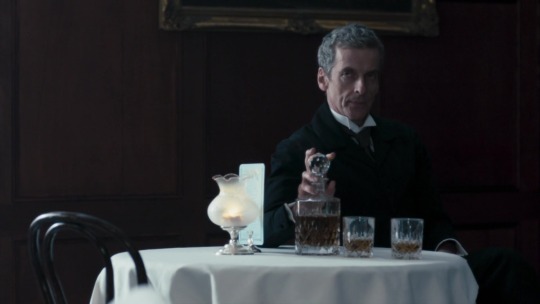
Still struggling with his regeneration, the new Doctor investigates a series of mysterious murders in Victorian London...
Warning: Spoilers Sweetie
Usually you find the dinosaurs inside parliament, not outside it.
Unless there’s some last minute secret cameo in ‘Twice Upon a Time’, this is the last episode with the Paternosters. Why’d you retire them, Moffat? Why?
“It's dropped a blue box marked Police out of its mouth. Your grasp of biology troubles me.”
It didn’t at the time, but Twelve with short hair just looks so wrong now. Like a caged beast, it should be allowed to roam free.
Peter looks so good in Matt’s outfit. Why do new Doctors always look so good in their predecessors outfits?
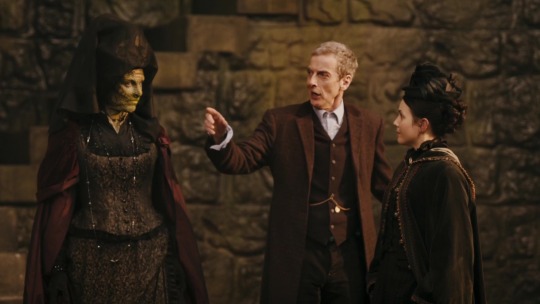
“Oh, you've got a dinosaur too.”
“He's not Clara. I'm Clara.” "Well, you're very similar heights.”
New titles with added eyebrows. This was based on a concept by a fan.
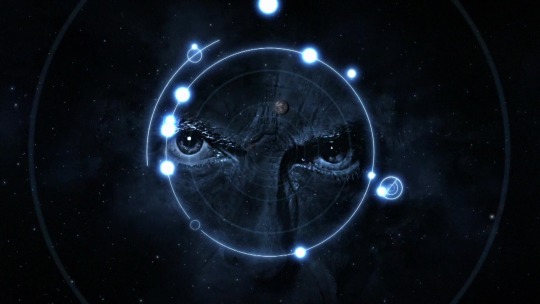
“You all sound all English. Now you've all developed a fault.”
Neve gets to use her normal accent for once.
“People are apes. Men are monkeys.”
“How do we change him back?” Clara gets a lot of flack for this, because Clara gets flack for simply existing. People argue that she should be more except of regeneration since she knows about it and has met previous Doctors. But I think there’s a big difference between being aware of regeneration and actually experiencing it first hand. Eleven was the first Doctor she knew and as far as she was concerned he was her Doctor. Even when she met other Doctors he was still there at her side. But now he’s gone and there’s this complete stranger in his place. So I can forgive her for being a little selfish here and wanting her Doctor back.
“I don't like her, ma'am. I love her. And as to different? Well, she's a lizard.”
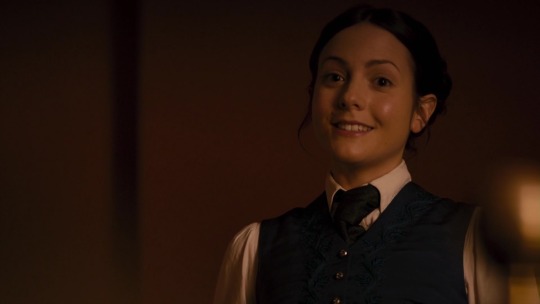
Clara says like because she doesn’t want to admit that she feels the same way about the Doctor that Jenny does about Vastra. She doesn’t want to admit that she loves the Doctor.
“I am alone. The world which shook at my feet, and the trees and the sky, have gone. And I am alone now. Alone.” That is one poetic dinosaur.
Peter Capaldi is one of those actors who could recite washing machine instructions and make it sound like Shakespeare.
“He looked like your dashing young gentleman friend. Your lover, even.” Clara’s blushing.
“Jenny and I are married. Yet for appearance's sake, we maintain a pretence, in public, that she is my maid.” "Doesn't exactly explain why I'm pouring tea in private.”
I feel for set decorators when they have to do stuff like this.
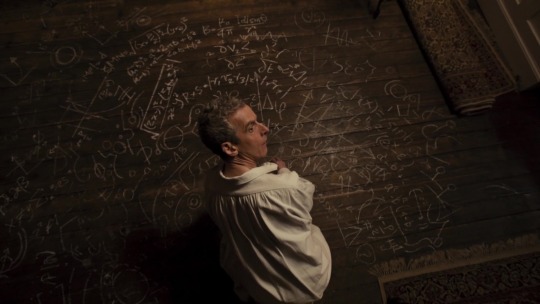
“Door. Boring. Not me.”
“I am not sure who you think you're talking to right now, Madam Vastra, but I have never had the slightest interest in pretty young men. And for the record, if there ever was anybody who could flirt with a mountain range, she's probably standing in front of you right now. Just because my pretty face has turned your head, do not assume that I am so easily distracted.” I’m not sure who is enjoying this tongue-lashing more, Jenny or Vastra.
“She was scared. She was scared and alone. I brought her here and look what they did.” 20 minutes in and Twelve is already breaking my heart.
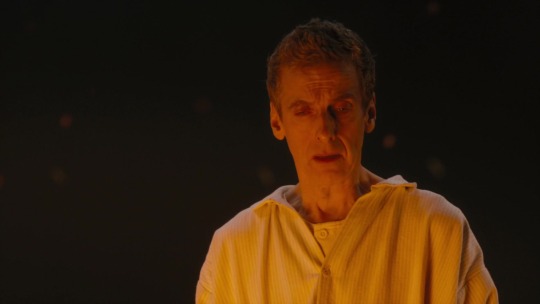
“What do you all have for brains, pudding? Look at you. Why can't I meet a decent species? Planet of the pudding brains.”
Couldn’t just walk away, he had to leap into the river. The Doctor is so extra.
“Military tactics. The Doctor is still missing, but he will always come looking for his box. By bringing it here, he will be lured from the dangers of London to this place of safety, and we will melt him with acid.”
Jenna Coleman was just born to wear period outfits.
How many of Britain’s most notorious killers has Vastra had for dinner?
Did Strax get his medical training from the same school as Doctor Zoidberg?
If this episode was the regular length, this scene, delightful as it is, would’ve been the first to get cut.
“Deflected narcissism. Traces of passive aggressive. And a lot of muscular young men doing sport.” Since Strax has trouble telling genders apart I’m going to assume that those weren’t all men.
This tramp is played by Elisabeth Sladen’s husband, Brian Miller.
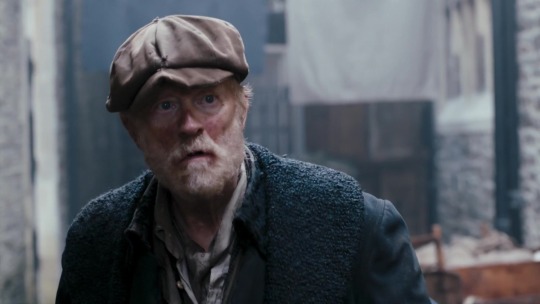
“It's good I'm Scottish. I'm Scottish. I am Scottish. I can complain about things, I can really complain about things.”
“What devilry is this, sir?” "I don't know, but I probably blame the English.”
“Oh, I don't understand why I'm doing this.” "Art?” Jenny is 110% done with your bullshit, Vastra.
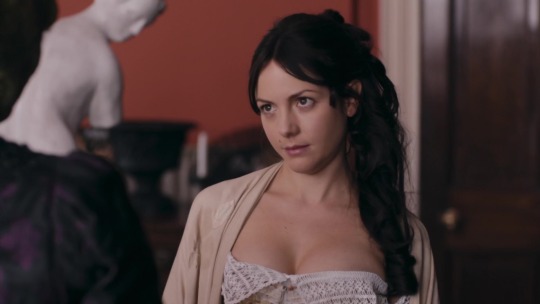
“Advertisements, yes. So many. It's a distressing modern trend.” If she thinks it is bad now wait until television comes along.
“It doesn't makes sense. He doesn't do puzzles. He isn't complicated. Really doesn't have the attention span.” Clara obviously hasn’t spent much time with Seven.
This is the first real scene that Peter and Jenna get to have together and our first chance to see just how amazingly they play off each other. They really bring out the best in each other as actors.
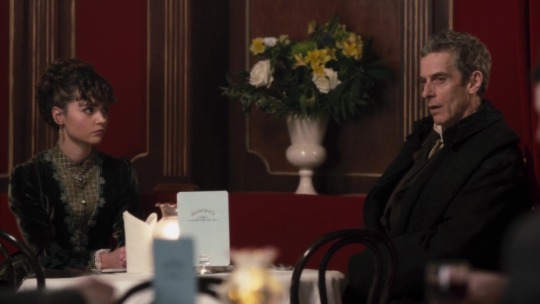
“Well, I would say that that person would be an egomaniac, needy, game-player sort of person.” Probably the most accurate description of the Master ever.
“Nothing is more important than my egomania.”
“If I got new hair and it was grey, I would have a problem.” Clara is so vain, it’s one of the things I love about her.
I doubt this place has any Michelin stars.
“Do you have a children's menu?” I really don’t want to know what is on the children’s menu.
“Oh, it's at times like this I miss Amy.”
I know that he doesn’t actually leave her, but it is still a shock to see the Doctor so casually abandon Clara.
“Go on, then. Do it. I'm not going to answer any of your questions, so you have to do it. You have to kill me. Threats don't work unless you deliver.” This is one of Clara’s finest moments. Even though she is clearly terrified, she manages to turn the tables on her interrogator and get him to spill the beans instead.
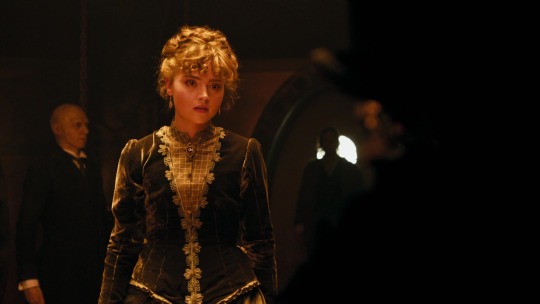
“Are you trying to scare me? Well, cos I'm already bloody terrified of dying. And I'll endure a lot of pain for a very long time before I give up the information that's keeping me alive. How long have you got?”
“I don't know. But I know where he will be. Where he will always be. If the Doctor is still the Doctor, he will have my back. I'm right, aren't I? Go on. Please, please, go on, say I'm right.” You were right, Clara.
Twelve’s Theme kicks in at full blast. As much as I love it, it just doesn’t have quite the same blood pumping effect as ‘I Am the Doctor’.
“Yeah, sorry. Well no, actually, I'm not. You're brilliant on adrenaline.”
“I hate being wrong in public. Everybody forget that happened.”
The squad is here.
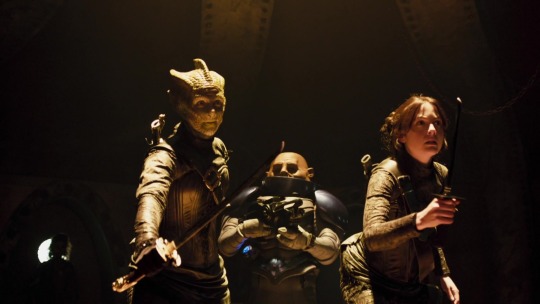
“Your friend is intelligent. He'll know better than to follow me.” You sure about that?
“I've got the horrible feeling I'm going to have to kill you. I thought you might appreciate a drink first. I know I would.”
Doctor Who is the only show that could get away with having a hot air balloon made of human skin on prime time BBC One.
“Sister ship of the Madame De Pompadour. No, not getting it.” Understandable considering, from his perspective, it has been nearly a millennium since season two.
“No, it isn't. It's just far away. Everything looks too small. I prefer it down there. Everything is huge. Everything is so important. Every detail, every moment, every life clung to.”
“Question. You take a broom, you replace the handle, and then later you replace the brush, and you do that over and over again. Is it still the same broom?” Better known as the Trigger conundrum.
“There's not a trace of the original you left. You probably can't even remember where you got that face from.” Moments like this are why I think Peter Capaldi is the best actor who has ever played the Doctor.
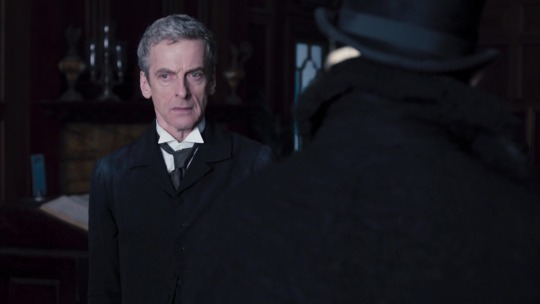
“Self-destruction is against my basic programme.” "And murder is against mine.”
It’s not a proper kiss, but I’ll take it.
Strax was willing to kill himself just so he would’t reveal his friends.
That glare still sends a chill down my spine.
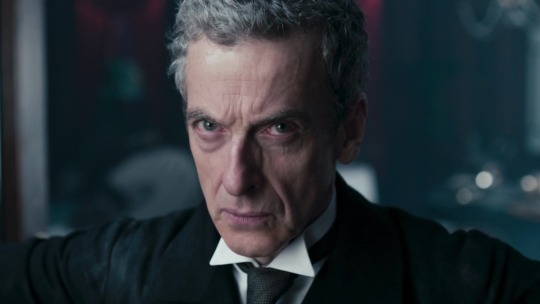
“I don't think I know who the Doctor is any more.”
He’s redecorated and I do like it, especially the bookshelves. Place looks so homely now.
“I'm the Doctor. I've lived for over two thousand years, and not all of them were good. I've made many mistakes, and it's about time that I did something about that.”
By admitting that he thought he was Clara’s boyfriend he is pretty much admitting that he’s in love with her.
She doesn’t say it, but she clearly likes the new look.
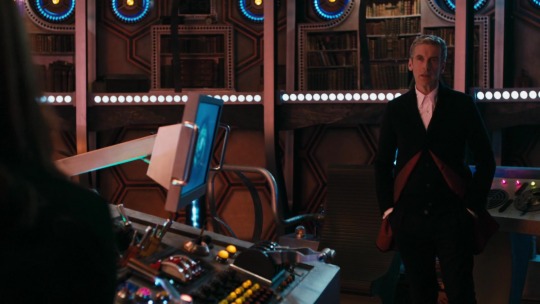
“You'd better get that. It might be your boyfriend.”
And now we know why the phone was left hanging.
“...and I think you might be scared. And however scared you are, Clara, the man you are with right now, the man I hope you are with, believe me, he is more scared than anything you can imagine right now and he, he needs you.” Glad I didn’t watch this right after ‘Time of the Doctor’. I would not have been able to go through saying goodbye to Matt again twice in one day.
“You can't see me, can you? You look at me, and you can't see me. Have you any idea what that's like? I'm not on the phone, I'm right here, standing in front of you. Please, just, just see me.”
The first of many awkward hugs.
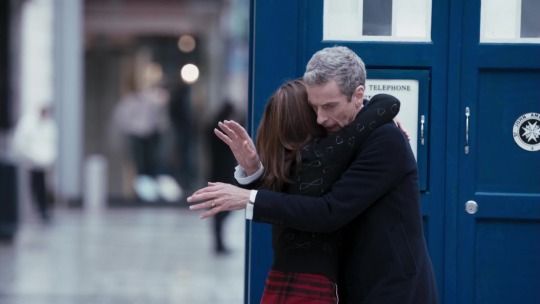
They go for coffee, not chips, so relax Doctor/Rose shippers. No one is stepping on your moment.
Oh Missy, you're so fine. You're so fine you blow my mind, hey Missy! Hey Missy!

Next Time: Into the Dalek
#Doctor Who#DW#Moffat Era Rewatch#The Doctor#Twelfth Doctor#Clara Oswald#Madame Vastra#Jenny Flint#Strax#Eleventh Doctor#Missy#Deep Breath
24 notes
·
View notes
Text
Tim Burton and the Cult of the White Freaks
by Archita Mittra (20), India
I almost didn’t write this article. When I was 12 or 13, I went through an intense punk phase, complete with electric blue highlights, ripped jeans, inscribing Green Day lyrics on the walls of my room, and a vocabulary of extremely colourful expletives. I was a devoted rebel without a cause. I was suffering from a severe identity crisis. I’ve always been a weird person. I’ve always liked the strange and eccentric characters. I took to writing emo poetry and creating morbid art, because I couldn’t speak, because for the most part of my childhood and my teenage years, I didn’t have the right words, the right face, the right personality, to fucking speak. I’m 20 now, and I still make morbid stuff, and things have changed, but only a bit. I close my eyes and I’m back there in that dark room with no light, a child with sewn lips, trying to articulate a trauma that knows no language. Somewhere in that demented darkness, I discovered, among other things, the films of Tim Burton. I fell in love with him and just some months back, I think, he betrayed me. This is why I almost didn’t write this article. Let me tell you why I fell for him in the first place. My skin’s brown as a dried walnut, and I’ve resigned myself to the fact that it’s going to stay that way, even if in my fantasies I’m white as Mia Wasikowaska’s Alice exploring a Gothic wonderland and having tea with a Mad Hatter wearing too much of white face paint. And, for as long as I could remember, that was a problem to everyone else. Why wasn’t my skin tone as fair as my parents, all my relatives would whine at every wedding and social gathering that my shy and introverted self was forced to attend. In holiday pictures, people teased me by asking if I was adopted. My classmates and I would play a game where the person with the lightest skin tone would win. During the annual school play, I was supposed to be grateful because I was getting to wear an expensive and exquisitely beautiful gown, pretending to be a spoilt stepsister and not the beautiful and oh-so-white Cinderella. Hey, at least I got the limelight for a bit. And yeah, it’s so okay, that even the colour pencils I use to make my art, label the peachy-pink tone as ‘skin’ and my brown flesh as well, just brown. Brown as tree bark, I suppose. For a long time, I kept telling myself that my shyness, my social anxiety, my crippling depression wasn’t because of all the bullying I had to endure at school, wasn’t because I was darker than everyone else around me, that it was just a manufacturing defect. Isn’t it normal for people to make fun of those who st-st-stammer? Isn’t it abnormal to st-st-stammer when you’re talking about the things you love and the things you fear? So, I did the only thing I could. I stopped talking. I wrote instead, but even that frightened me. Tim Burton was the best friend I never had. Because his films with all their Gothic visuals and macabre aesthetics, were about people supposedly like me. Beetlejuice wasn’t my first Tim Burton film but it is significant in two respects. One, it was Burton’s breakthrough film that landed him the offer to direct the blockbuster Batman films and kick-start the superhero industry. Two, it introduced to the world what is now regarded as the popular stereotype of the Goth girl: the charming Lydia Deetz. For my depressed 14 year old self who was tired of making up imaginary friends to play with and slitting wrists, the black-clad, eye-liner-wearing psychic and photography enthusiast became both my role model and my mirror image. She was introverted (yay), creative, super duper depressed and could talk to ghosts. She was me! Of course there was something strikingly wrong with this image and I tried to ignore it by smearing a shit load of face powder on my brown brown face: she was white. Years later, Tim Burton’s trademark vision gave way to the pastiche dark fantasy comedy Dark Shadows, which although failed commercially, greatly pleased me aesthetically. Johnny Depp was playing a delicious vampire, fashion icon Helena Bonham Carter was a psychologist, a sassy teenage girl was later revealed to be a werewolf, the whole family was as dysfunctional as mine and the soundtrack included both the Carpenters and Alice Cooper. What else could a lonely POC girl, steadily losing her mind in a world of Gothic films that reflected back her own emptiness and strangeness, ask for? And even now, despite everything that has happened to me, Edward Scissorhands still remains as one of my favourite films, and although I pride myself as the type of person who doesn’t cry while watching a movie, my eyes were watery by the time Edward and Kim had parted ways and Edward remained in that dark castle, lonely as he ever was, making snow with his scissor hands. I was simultaneously Edward, this misfit-monster abandoned by God and his parent, and Kim, the suburban girl, slowly tasting what it is to love a stranger whose heart is so familiar and to dance for the first time in snow. And I thought, as I watched the pain in Edward’s eyes that it was Burton and not Edward, who was pleading to the audience to look beyond appearances and voicing for the first time, his childhood issues of alienation and misrepresentation. Soon after watching the film, my diary entries (I kept several journals because I didn’t have ‘real life’ friends to talk to) began to be addressed to a mysterious man named Edward while the Johnny Depp fan art I made bore the note ‘the only Edward I ever loved’ much to the annoyance of my Twlight-obsessed classmates. The movie wasn’t perfect, but then again, most beautiful things never are. And I’d long outgrown my fangirly love for Depp, long before those allegations about abusing Amber Heard began. But the love story with Tim Burton doesn’t end here. In 2010, when Alice having slain the Jabberwocky is preparing to leave, the Hatter softly requests her to stay. Alice promises to come back but the Hatter is unconvinced, saying she won’t remember him. Alice was not ready to comprehend the implications of that exchange, but I did and it terrified me to death. Tim Burton’s movies were the wonderland I would run away to, to escape my harsh reality, to forget this world that wouldn’t treat me as one of them, because I wasn’t fair enough, because fuck it, I wasn’t normal enough. I was trapped in the world of the Mad Hatter, a dream concocted by Alice, a world that is fragile and ephemeral, a world that disappears the moment Alice wakes up and forgets her dream. I’ll come back to this later, but for now, let me tell you the final lesson I learnt from watching Tim Burton’s movies: I learned to hope. In his delightful stop-motion animated feature Frankenweenie, Victor attempts to bring his dead pet dog Sparky back to life and he does so with disastrous consequences. Watching it and remembering all the pets I’d loved who died and would sell my soul to bring back, I was filled with a childlike sense of hope and the realization that I wasn’t alone for believing in and desperately hoping for impossible things, I wasn’t alone in being misunderstood and misrepresented. For once being the weird kid in class and scribbling poems and doodles on the sly, didn’t matter. Not having people to connect to, or appreciating me for the messed-up person I was, didn’t matter. I was okay. I didn’t have to be normal like everyone else, because there were people like Tim Burton who could totally get me. At least that’s what I felt when he said stuff like, ‘I think a lot of kids feel alone and slightly isolated and in their own world.’ And as much morbid a Tim Burton film may appear to a first time viewer (especially if it’s Corpse Bride), Burton’s characteristic brand of Gothic-ness wasn’t so much as a celebration of death, as it was a celebration of life. Working within the Hollywood system, Tim Burton has managed to retain his personality and also be, subversive. And that was so fucking inspiring to me. Why then did this man, who dresses up in black, whose films have tried to teach me to fall in love with myself and to believe in magic, miracles and impossible things, suddenly, betray me? Miss Peregrine’s Home For Peculiar Children should have been my perfect film. After all, it’s a film about kids who are eccentric and don’t fit in, has time travel and a love story thrown in the mix and a secret house where they can be themselves. It is exactly the stuff I relate to and enthusiastically devour. But this is what Tim Burton did. When asked about the lack of diversity in his films, he said ‘Nowadays, people are talking about it more. But things either call for things, or they don’t. I remember back when I was a child watching The Brady Bunch and they started to get all politically correct, like, OK, let’s have an Asian child and a black — I used to get more offended by that than just — I grew up watching blaxploitation movies, right? And I said, that’s great. I didn’t go like, OK, there should be more white people in these movies.” In that singular moment, my whole carefully-constructed illusion came crashing down, so efficiently, I didn’t even realize it. Okay, I told myself, I’m a POC and I’m not ‘called for’. All through my life I have been worshipping a man in whose imagination, I have no space, I do not exist. I’m the Mad Hatter in Alice’s world, alive for a short time, useful as a plot device and erased out of the narrative, the moment Alice returns to the real world. Is this the kind of space WE occupy in the white imagination? Okay, I tell myself. At least unlike Steven Moffat, he isn’t famous for saying a string of problematic things. Okay, perhaps it was someone else’s fault- maybe Ransom Riggs or a Disney executive didn’t want too much tampering with the too-white source material( Never mind what he did with Charlie and the Chocolate Factory by adding a back story to Willy Wonka that I totally loved). Plus if he really suffers from Asperger’s Syndrome, as his ex-partner Helena Bonham Carter claimed, we shouldn’t take his words to heart. Maybe he didn’t mean it. It’s just one blunder, I told myself. It doesn’t change anything. But it did. It changed everything. I couldn’t make any more excuses. Taking a look at his entire filmography-a career spanning over three decades- I realized that casting white, pale-as-death people is his artistic and directorial choice. It’s his fucking personal and creative choice. He just said that out loud. And it’s shoved into my face that this is a world running on white privilege and racism and hate crimes. That it’s the discrimination that POC face on a daily basis both from the whites and the communities who have internalized such values is the reason why I’m too afraid to even consider studying abroad in the UK or USA because Brexit and Trump administration yada yada, why I’m never ‘pretty enough’ to be considered to take part in college fashion shows built on patriarchal beauty conventions, why I still spend a part of my earnings on cosmetics that promise me ‘fair’ skin. My skin color isn’t an issue, most charming hypocrites will claim, it’s my shyness and weirdness and my lack of fucking ‘normal-ness’ that’s to blame. I wish someone would just tell me that I was born okay, that I am okay, that I’m not some sort of manufacturing defect most people think I am. In other words, Tim Burton’s niche audience wasn’t as inclusive as I made it out to be. It had outsiders and misfits yes, but only the white ones. Tim Burton’s fan club is a cult of white freaks, not Black freaks, not POC freaks, not any non-white freaks. I can’t be a part of this fan club, because in their world, I don’t exist. I am not ‘called for.’ When Ash Davis responds to Burton’s comment, she writes this brilliant article and says, ‘I write fanfiction for the people Tim Burton says are not ‘called for’. My mind, likewise, is a movie theatre where I edit my favourite films and include myself in the lead. I change the endings, add more romance when I’m lonely, put on costumes so outrageous that my mum won’t even let me wear on Halloween, deliver the dialogues my mouth will never speak, and feel a sense of belonging that is every bit delightful and artificial and illusory. In the films I direct in my mind, I look like the typical Tim Burton heroine. I’m white, not brown. This is what the white gaze has done to me. When I fell in love with his films, I thought I was seeing myself reflected back in Jack Skellington, in Lydia Deetz, in Edward Scissorhands, in Ed Wood, in Willy Wonka, in the Mad Hatter, in young Victor, in the Corpse Bride, in Ichabod Crane, but I never saw myself. I only saw what I wished so desperately to be seen as. Do I stop watching Tim Burton films after that racist comment? No. A part of me still hopes he’ll apologize or better yet include people who actually look like me in his next film. A fangirl, can hope, right? After all his films did help me to get through some dark times, albeit in a twisted way and I can’t erase those tense growing-up years when his oddball characters were all I could hold onto. But at the end of the day, he belongs to the mold of white film directors who make white movies for a predominantly white audience and think diversity POC-narratives aren’t important at all. But do Tim Burton films help me feel less lonely and less marginalized and less threatened by the big bad world out there? Not a bit.
14 notes
·
View notes